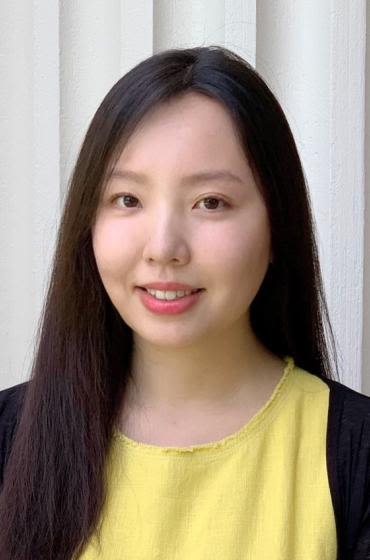
College of Education Newsletter

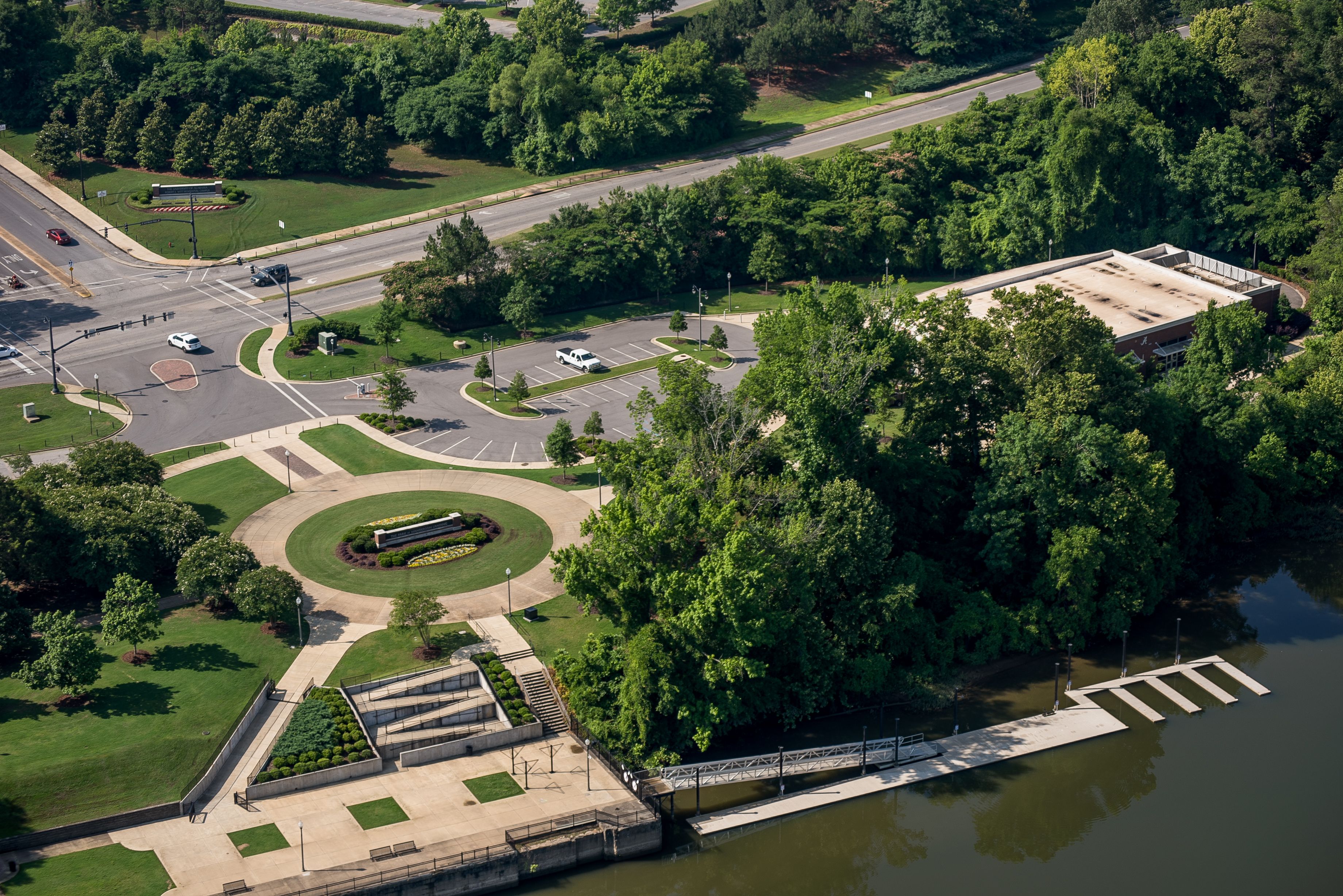
Dr. Liza Wilson takes on new role as interim dean
Over her 32 years at UA, she has served the College of Education in a variety of capacities
It’s clear to those who know Dr. Liza Wilson that her dedication to The University of Alabama, as well as the College of Education, the Dean’s Office, and her colleagues is resilient and authentic. Throughout her 32 years at the University, she has stepped into a variety of roles within the College and remained devoted and passionate about her career in education.
On July 1, Dr. Wilson officially started a new chapter with the College, transitioning from her previous position as senior associate dean to that of interim dean after Dr. Peter Hlebowitsh announced this spring that he would be stepping down from the position.
“I'm excited about continuing the work we've been doing for the last 10 years under Peter’s leadership,” she said.
During those 10 years, the pair have worked side by side, leading the College of Education while also forming a strong bond and partnership, something that has been a blessing, Dr. Wilson said.
“Peter has devoted his professional life to education,” she said. “He has been selfless in the time he has devoted to the College during his service as dean. I am pleased that he will have time to focus on his own professional pursuits and spend more time with his family.”
Dr. Hlebowitsh will continue his role as professor within the College while Dr. Wilson will serve as interim dean until a new successor is appointed.
“I want Peter to know how grateful I am for his service to our College,” she said. “I appreciate his leadership and willingness to be an advocate for our faculty, staff, and students.”
With Dr. Wilson as interim dean and Dr. Joy Burnham as the new senior associate dean, the College has entered a new phase of leadership eager to further its successes. This also makes Dr. Wilson only the second woman to hold the title of interim dean of the College of Education.
“I am excited and appreciate the confidence that people have in me to continue the accomplishments made by our faculty, staff, and students,” she said.
Dr. Wilson started her career at The University of Alabama as an assistant professor in the College of Education and has taken on several roles over the past 32 years. She was an early member of the Clinical Master Teacher program, which she has remained part of for 29 years, as well as involved with the Alabama Consortium for Educational Renewal and the Parent Teacher Leadership Academy, both partnerships that include Tuscaloosa City Schools and the Tuscaloosa County School System.
Teaching has remained an important of Dr. Wilson’s academic life, and she knew she didn't want to give that up when she made the professional move to administration.
“My passion is working with students, working out in the schools, and combining research, teaching, and service,” she said.
Continuing to work with interns and the educators who mentor them over the years has been an exciting part of her career, as has teaching classes in the Tuscaloosa City Schools and Tuscaloosa County School systems.
“That’s why I came in the first place,” she said. “It's why I pursued a career in teacher education, because of those relationships and wanting to do something that helps schools and P-12 students.”
Several of Dr. Wilson’s colleagues are former education students of hers and watching them build careers – whether returning to the university, working in local schools, or branching out elsewhere – has been extremely gratifying, she said.
“When you get to see your students working in schools in different capacities or you get to see them working in the College in different roles, that is so rewarding,” she said. “I have former students who are superintendents, principals, or classroom teachers. My former students include clinical master teachers that I worked with this (spring) semester, so it’s really rewarding when you get to see them professionally grow and develop when you've known them so long.”
Spring 2023 was especially memorable for Dr. Wilson for multiple reasons. Earlier in the semester, she played an integral role in preparing the College of Education for its accreditation review, working diligently with her fellow Assessment Team members to ensure a successful outcome. The Council for the Accreditation of Educator Preparation (CAEP) review team provided the College an exceptional review recommending no stipulations or areas for improvement, which is an exceptional accomplishment.
“The College of Education was able to meet a high level of achievement through the authentic, ongoing, and exceptional efforts of our faculty, staff, current students, graduates, stakeholders, and P-12 partners,” she said around the time of the review.
She was also named the 2023 winner of the E. Roger Sayers Distinguished Service Award during the UA Spring Campus Assembly on April 19. UA President Dr. Stuart Bell presented her with an engraved plaque during the ceremony in recognition of the prestigious honor.
“I was just humbled by the whole thing,” Dr. Wilson said. “Knowing Dr. Sayers, his character, and all he did for the University, to even be acknowledged under the same award meant a lot. Then, just knowing that some of my colleagues thought enough to nominate me is a big honor.”
Being part of The University of Alabama has even become a family affair over the years, which adds to the sentimental value of her time and her career at the Capstone.
“I love the University and had the opportunity to meet my husband here,” Dr. Wilson said. “Both of our boys went through the child development program and attended UA as undergrads. We definitely have been an Alabama family. My husband works here, too. That's been a blessing.”
Throughout her career at the University, her dedication to the College of Education has never wavered.
“Knowing the good work that goes on and (my) relationships with faculty, I kept doing things with the department all these years because I didn't want to leave. My department has been important to me, who I am, and the paths that I've taken,” Dr. Wilson said.
At the close of the spring semester, she taught her last class as a professor, which was a bittersweet moment as she won’t be teaching courses while serving as interim dean. Dr. Wilson also plans to retire once the new dean has been appointed and takes office.
“It's been a labor of love, and I could not have asked for a better place to be,” she said. “The faculty and staff here in the College of Education and my colleagues out in the school districts have just been a joy for me.”
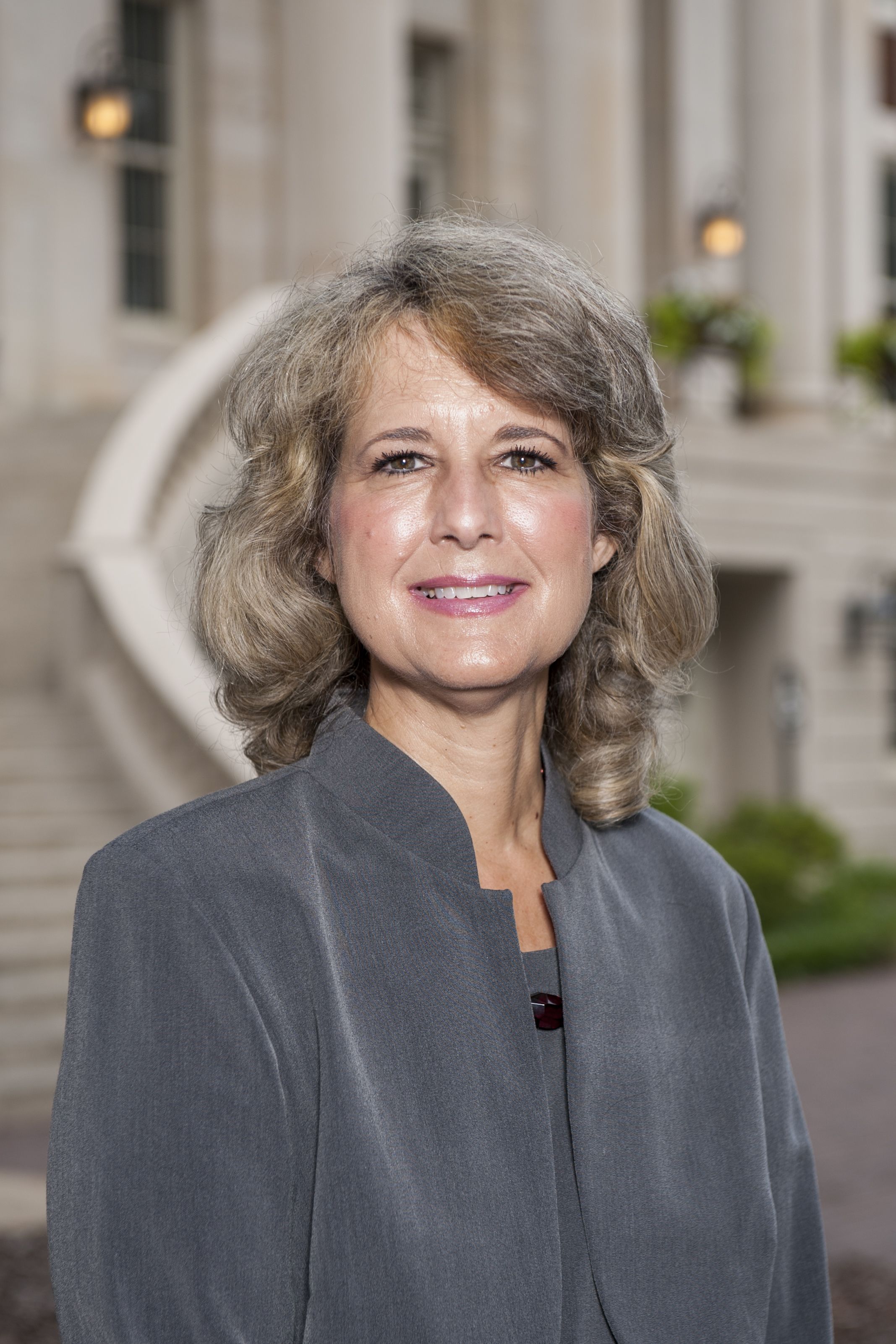
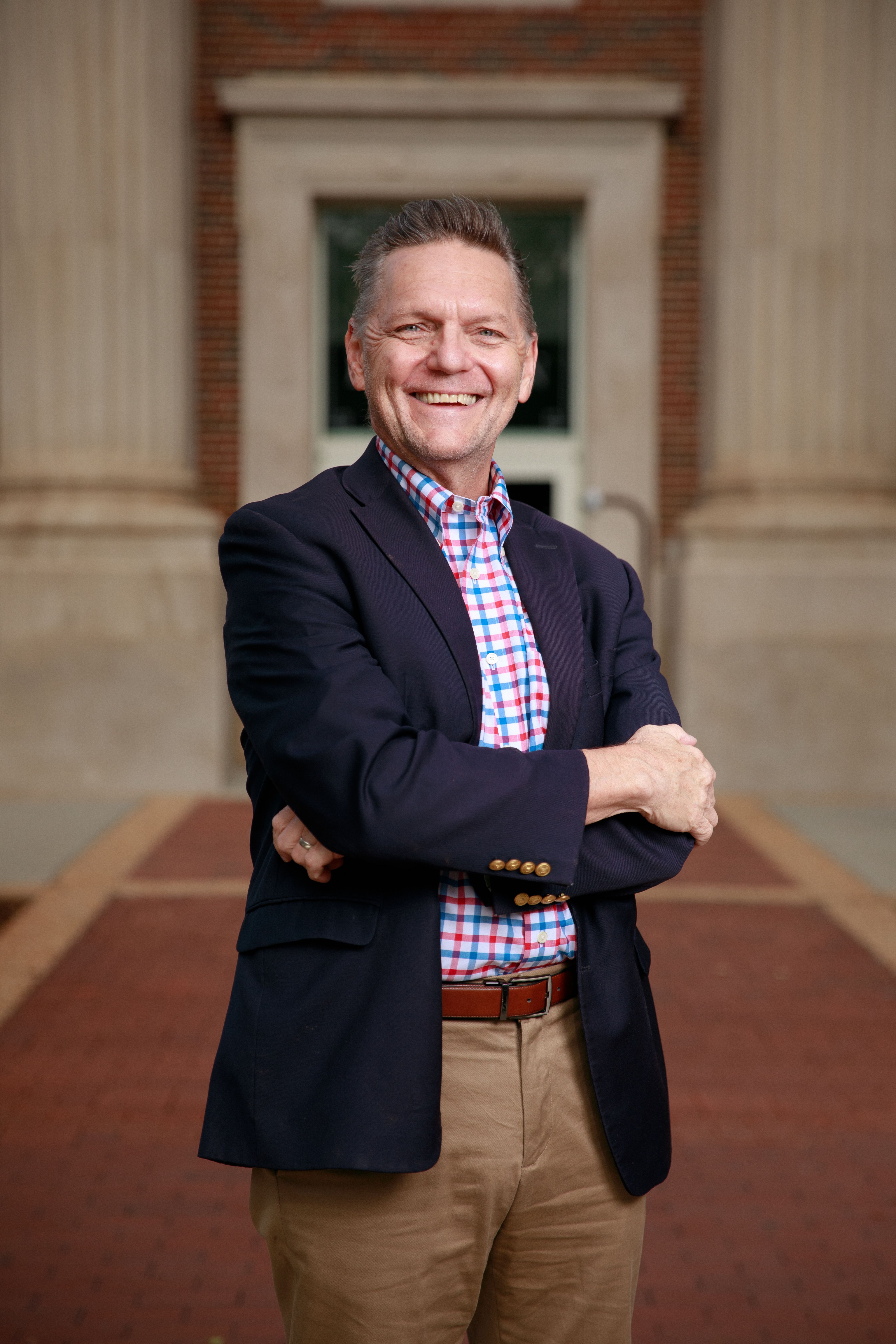
A decade of progress
Dr. Peter Hlebowitsh leaves behind legacy of growth, inclusion, and dedication as dean
When Dr. Peter Hlebowitsh and his wife Erica decided to leave Iowa for Alabama, they had just become empty nesters for the first time. They knew they were taking a risk – but they were also ready to make a change.
“We just looked at each other and asked ourselves if we wanted to try something new and different, to look for an adventure,” Dr. Hlebowitsh said.
The couple didn’t know much about The University of Alabama – or about living in the South, for that matter, he admitted. But when he was offered the position of dean of the College of Education, he accepted it, confident following his interview in the College’s potential to grow and flourish, he said.
Their hunt for adventure brought them to Tuscaloosa, and what may have seemed a risky decision at first turned into 10 fruitful years at the Capstone.
Under Dr. Hlebowitsh’s leadership, the College has risen to new heights, cementing his legacy in education administration and at the University.
“The year that I got here, the College had about $3 million in grants and contracts. Last year, we did ($15 million), so a five-fold increase,” he said. “I would say five-fold is right – we're about five times better.”
The College’s research profile and capacity to secure grants have never been stronger, raising its aggregate research productivity index from the 51st national percentile in 2013 to a percentile score of 87th in 2022. A vital part of boosting grant-supported work has been recruiting and hiring young, talented, interventionist researchers, which has also helped to give the College a better public profile and lead to other successes, including the founding of an Educational Neuroscience program that serves both undergraduate and graduate students.
A goal to increase inclusion and diversity led to significant increases in the percentage of minority students enrolled in both the undergraduate and graduate degree programs, each representing about 50 percent gains since 2013, as well as a 50-percent increase since 2017 in the number of minority students earning scholarships from the College. Additionally, 30 percent of the doctoral degrees conferred by the College in 2023 went to African American students. Accomplishments such as these speak to Dr. Hlebowitsh’s believe that “diversity isn’t the spice of life, but the essence of life.”
Emphasizing public engagement is beneficial to the College’s research and helps it to determine what needs a community has and allows it to better assist those communities through partnerships, school-based support systems, outreach programs, and additional efforts.
“Our signature has been to try to lift the lives of teachers, faculty teachers, children, families, and communities and to do it in a way that also empowers the research engine of the College,” Dr. Hlebowitsh said. “That's been our signature, and that's really been the secret to our success.”
Throughout his administration, the College of Education has supported initiatives that strive to make a difference across communities, programs dedicated to helping young people with physical or cognitive disabilities, young people in need of additional aid or guidance, infants and toddlers with autism, struggling families, and others. It has participated in collaborative efforts that include investing in two pre-kindergarten classrooms through the Gadsden Early Learning Initiative, partnering with the Smart Foundation to make school-based health clinics available across the Black Belt as well as the Mott Foundation to implement a statewide afterschool and summer learning program.
“Our signature has been to try to lift the lives of teachers, faculty teachers, children, families, and communities and to do it in a way that also empowers the research engine of the College.”
Dr. Hlebowitsh said knowing the impact this type of outreach can have while continuing to lift and support members of the community is a satisfying feeling.
“Let's say you have a kid who is struggling with reading or struggling with behavior, or a kid who is wreaking havoc – if you make that child better, you make everyone around that child better. You make the parents better. You make the family better. If you make the family better, the improvements just continue, and everything around them gets better,” he said. “It's a very heartening thing to know that if we can do that, and if we can help somebody who really does need help, the effects are iterative. They move outward from the person that you're helping, and that's really something.”
Another heartening experience has been witnessing the advancements and the victories of faculty and staff, especially those who have been with the College since the beginning of Dr. Hlebowitsh’s time as dean.
“It's a great celebration for me,” he said. “It's a quiet celebration, but it's a great one whenever one of our people gets tenure or gets promoted who I personally hired. I have faith in their success.”
Under Dr. Hlebowitsh’s administration, there have been many historic milestones. The College aided in the construction of Stran-Hardin Arena, a state-of-the-art sports facility tailored for student-athletes with ambulatory disabilities, the only one of its kind, and the home of Alabama Adapted Athletics.
He said he is particularly proud, though, of the College’s collaboration from students and faculty with the UA Board of Trustees and their pivotal role in the renaming of Graves Hall to Autherine Lucy Hall and Moore Hall to Wade Hall.
“I feel like we've bent the arc of the University's history in a direction of reconciliation and understanding,” he said.
After 10 years as dean, Dr. Hlebowitsh is stepping down from the position, leaving behind an impressive legacy while also opening the door for his successor to accomplish great things.
Dr. Liza Wilson will take over as interim dean for a year starting July 1, a responsibility Dr. Hlebowitsh said he is very grateful she is willing to take on.
“(Dr. Wilson) is so capable and so hardworking. She knows this college like the back of her hand,” he said. “We've been together from the beginning. Everything that we've done, we've done together. She deserves as much credit for our achievements as I do.”
As things wind down, there is a sense of “mission accomplished” when looking back, Dr. Hlebowitsh said, but he also knows the College possesses the resources and personnel to reach an even higher level of success.
His advice to the incoming dean is the following: Bring in even more grant-supported research, work to retain faculty and staff, and, perhaps most importantly, to continue to lift the lives of community members in ways that also strengthen the College’s research.
“If I stayed here, we would do it,” he said. “But, you know, 10 years is enough. It’s somebody else's turn.”
Dr. Hlebowitsh is ready to move away from the 50-hour work weeks that being dean entails and toward a new chapter that allows him to spend more time with his family and grandchildren.
In spring 2024, yet another adventure awaits Dr. Hlebowitsh, though – this time in Europe. He will make three stops as he travels across the continent, working with graduate students and sharing his expertise along the way. One will be at the University of Vienna in Austria, another at the University of Linnaeus in Sweden, and the final stop will be at the Institute of Education in London.
“It's exciting because I'm going to get my chops back as a professor,” he said with a laugh. “When I return (to UA) in the fall of 2024, I'll be freshly empowered to teach and help however I can to move the College forward.”
UA College of Education to host second annual Empowering Educators Conference
The University of Alabama College of Education will hold a conference on emerging trends in education on Aug. 5 in Autherine Lucy Hall.
The conference will focus on providing teachers and future educators with information and a platform to discuss strategies on how to improve the outcomes for communities that have been underserved, will provide innovative approaches on how to maintain their passion and commitment to the teaching profession, and will activate maximal opportunities for underserved students by providing information on scholarship resources, partnerships, and mentorships through a diverse scope of educational understanding
Attendees will have choices of sessions ranging from how to optimize scholarship opportunities to leadership and exercising effective autonomy to representation in the classroom. Building resilience, balancing burnout, ethical responsibility, and the digital era of education will also be covered. Visit http://empoweringeducatorsconf.ua.edu/ for additional information and online registration. Lunch is included.
Contact: Dr. Carlton McHargh (mchargh@ua.edu)
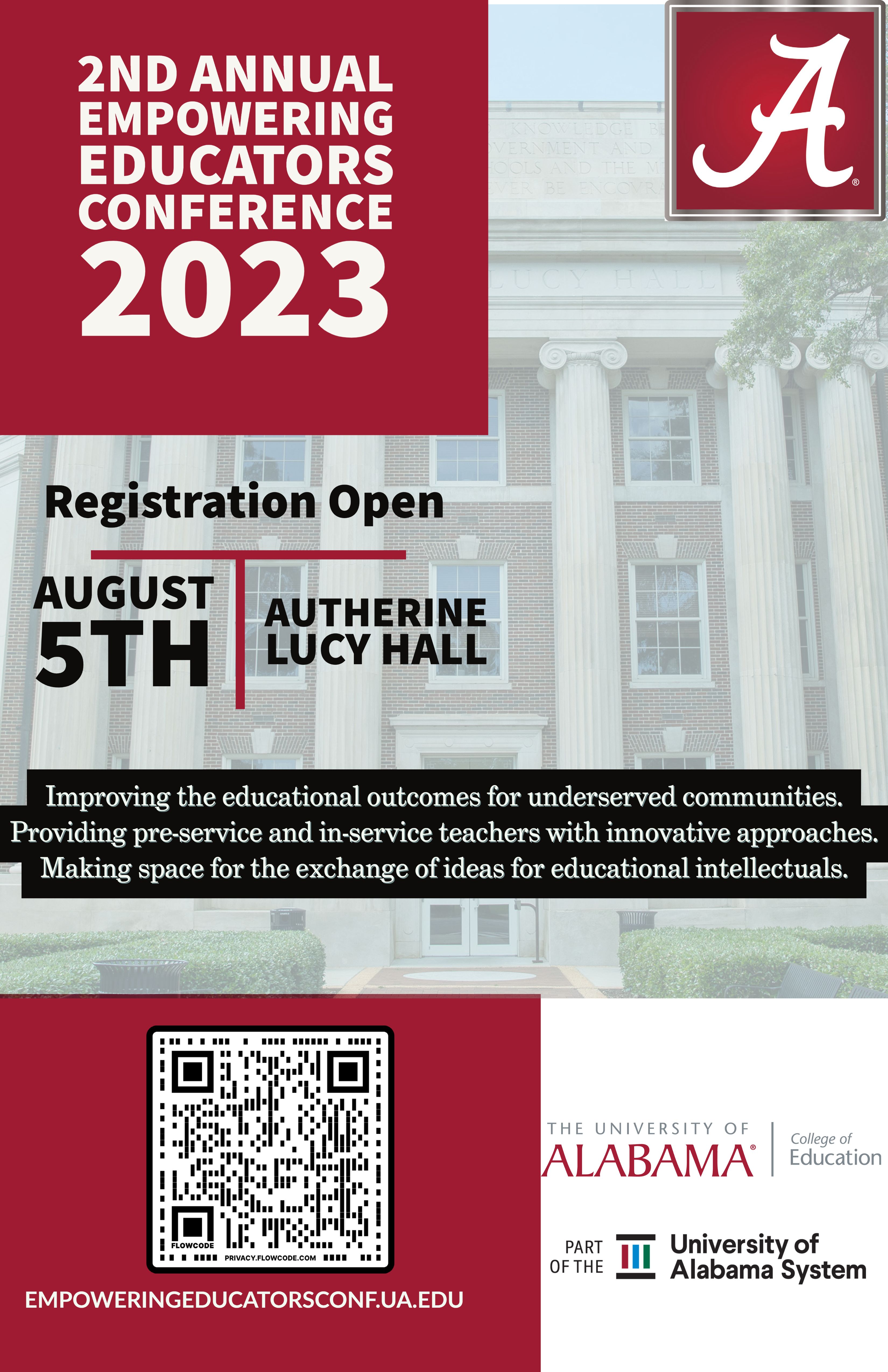
2023 New Faculty

Assistant Professor, Elementary Literacy Education
Assistant Professor, Elementary Literacy Education
Dr. Brittany Adams
Dr. Brittany Adams earned her Ph.D. in Literacy Education from the University of Florida. She additionally holds a bachelor's degree in children’s literature and a Master of Library and Information Studies in youth literacy. She was previously an assistant professor of literacy at State University of New York at Cortland as well as a research assistant at the School of Teaching and Learning at the University of Florida.
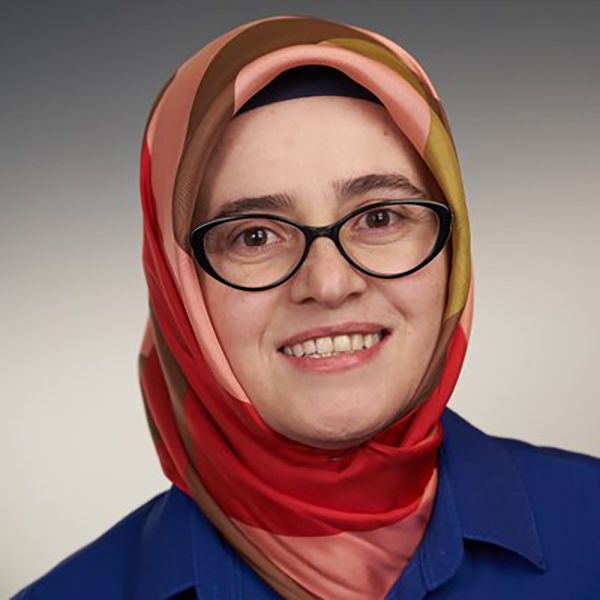
Assistant Professor, Mathematics Education
Assistant Professor, Mathematics Education
Dr. Nigar (Hazel) Altindis
Dr. Nigar (Hazel) Altindis received her doctorate from Syracuse University as well as earned two master’s degrees, one in statistics from the University of New Hampshire and another in teaching and curriculum in mathematics education from Syracuse University. Altindis previously served as a postdoctoral research assistant at the University of New Hampshire.
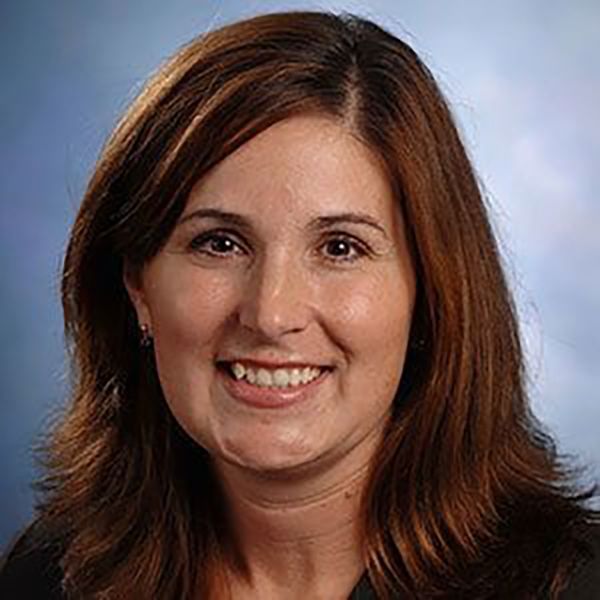
Professor, Mathematics Education
Professor, Mathematics Education
Dr. Susan Swars Auslander
Dr. Susan Swars Auslander earned a Ph.D. in elementary education with minors in mathematics education and educational research from The University of Alabama. She also has a B.S. in elementary education from Mississippi State as well as an M.A.T. in early childhood education from Piedmont College. Auslander was previously the Department of Early Childhood and Elementary Education interim chair and a professor of mathematics education at Georgia State University.
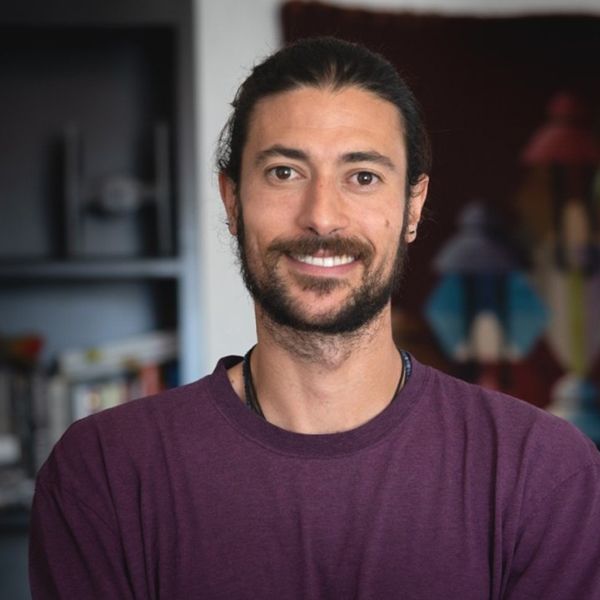
Assistant Professor, Qualitative Research
Assistant Professor, Qualitative Research
Dr. Miguel Casar Rodriguez
Dr. Miguel Casar Rodriguez received his Ph.D. from the University of California, Los Angeles, as well as a biomedical engineering degree from Universidad Iberoamericana, Ciudad de México, and a bachelors in science in psychology from Indiana University-Purdue University at Indianapolis. Casar Rodriguez previously worked as the University of Southern California School of Education’s post-doctoral research associate for the dean. He was also the 2023 SUGRS Keynote Speaker at the University in March.

Assistant Professor, Social Studies Education
Assistant Professor, Social Studies Education
Dr. Sean Corrigan
Dr. Sean Corrigan earned his Ph.D. in curriculum and instruction and education policy studies at the University of Wisconsin-Madison. He also received masters degrees in international studies from Oklahoma State University and in social studies education from Loyola Marymount University. In his previous role, he was an assistant professor with Southern Oregon University, and he taught social studies for 14 years outside of higher education.
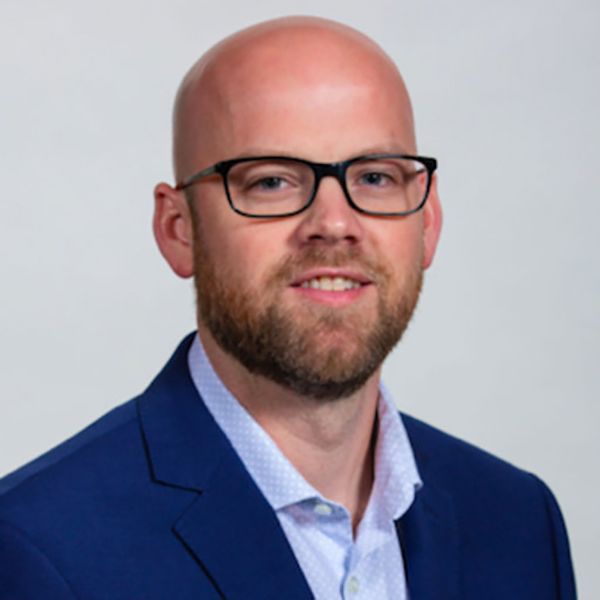
Assistant Professor, Exercise Science
Assistant Professor, Exercise Science
Dr. Kevin Crombie
Dr. Kevin Crombie received his doctorate in kinesiology, with a specialization in exercise psychology, from the University of Wisconsin-Madison. He was previously a postdoctoral fellow in the Department of Psychiatry and Behavioral Sciences at the University of Texas in Austin and a postdoctoral research associate in psychiatry at UW-Madison.
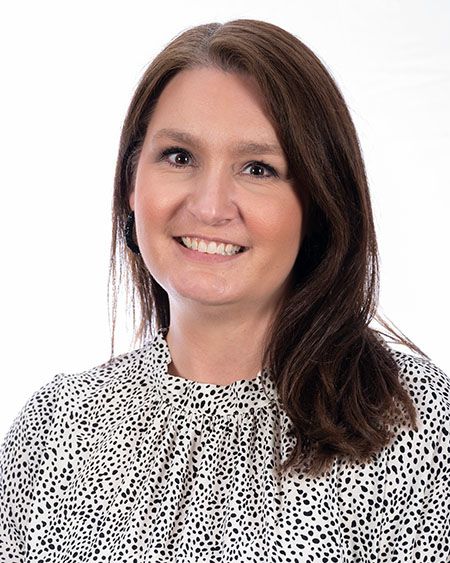
Clinical Assistant Professor, Curriculum & Instruction
Assistant Professor
Dr. Cortney Dilgard
Dr. Cortney Dilgard received her doctorate in curriculum and instruction with a specialization in literacy from The University of Alabama. She was previously an instructor at Jacksonville State University in the Department of Curriculum and Instruction. Dilgard also won a UA College of Education Most Outstanding Graduate Student Award for Elementary Research in 2022.
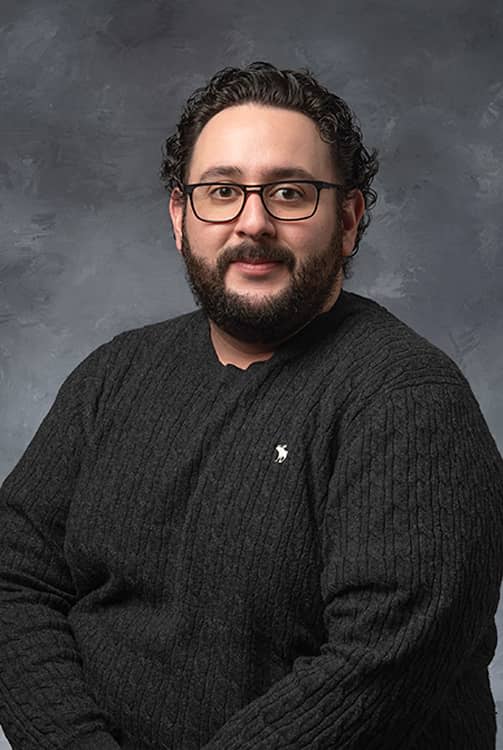
Instructor, Mathematics Education
Instructor, Mathematics Education
Angel Luis Figueroa-Rosado
Angel Luis Figueroa-Rosado will earn his Ph.D. in mathematics education and received his M.A. in educational measurements and statistics from the University of Iowa. There, he also served as a teaching and research assistant in the Department of Teaching and Learning. His research focuses on pre-service elementary teachers, particularly those anxious about teaching math.
Dr. Hee Jung Gong
Dr. Hee Jung Gong earned her Ph.D. from the Louise McBee Institute of Higher Education as well as a graduate certificate in interdisciplinary qualitative studies from the University of Georgia. Previously, she was a postdoctoral research investigator at the University of Michigan. Jung Gong also worked in research roles at the Center for Global Higher Education at Yonsei University and at the Korean Educational Development Institute.

Assistant Professor, Exercise Science
Assistant Professor, Exercise Science
Dr. Changki Kim
Dr. Changki Kim received his doctorate in kinesiology and exercise science from the University of Florida. He worked as a postdoctoral research fellow in health and social development at the University of British Columbia, a postdoctoral researcher at Medical University of South Carolina, and a postdoctoral associate at Florida International University.

Clinical Assistant Professor, Elementary Education
Clinical Assistant Professor, Elementary Education
Dr. Kantrele King
Dr. Kantrele King received her doctorate degree in elementary education from The University of Alabama, and she earned a master's of education in early childhood and elementary education from the University of West Alabama. She is a Holmes Scholar in the American Association of Colleges for Teacher Education through the Office of School Partnerships.
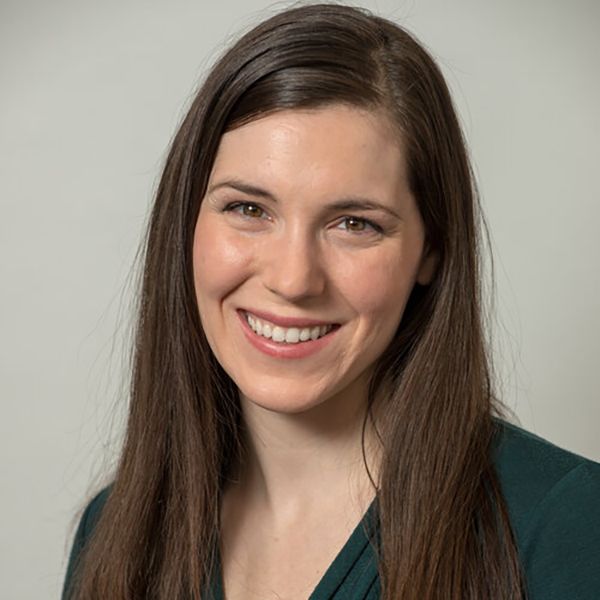
Assistant Professor, Educational Psychology
Assistant Professor, Educational Psychology
Dr. Sarah McKellar
Dr. Sarah McKellar earned her Ph.D. from the University of Michigan. She also received a Masters of Arts from the University of Chicago and Alliant International University-San Francisco Bay as well as a Bachelor of Arts from Colorado College. McKellar was previously a postdoctoral research scientists at the University of Pittsburgh’s Learning Research and Development Center and a high school teacher in the West Contra Costa School District in California.
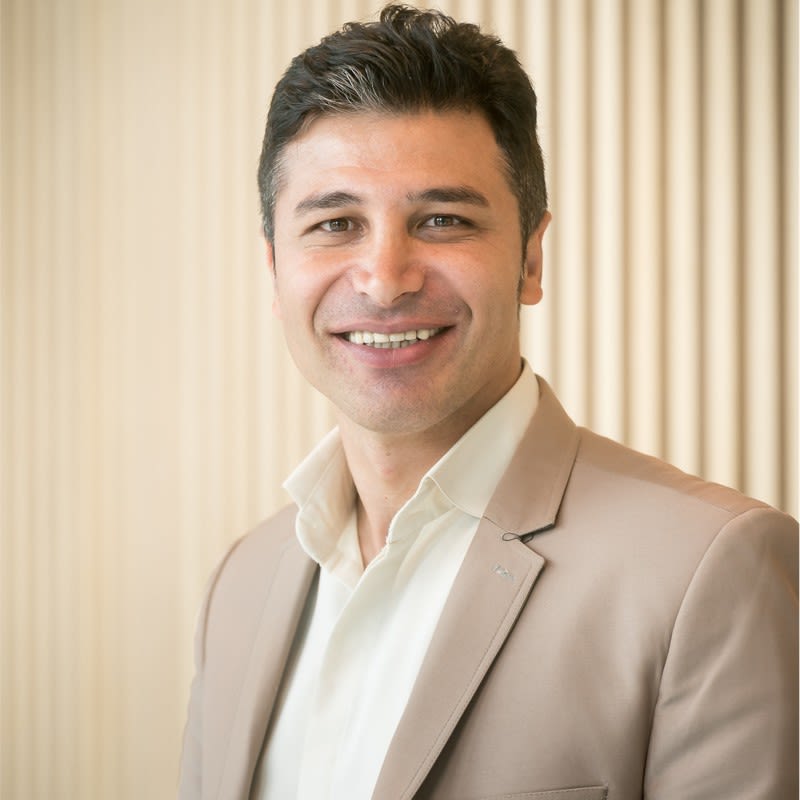
Professor, Instructional Technology
Professor, Instructional Technology
Dr. Omid Noroozi
Dr. Omid Noroozi received his doctorate in educational technology from Wageningen University in the Netherlands and a Master of Arts in agricultural water management from Tarbiat Modares University in Tehran. He was previously an associate professor at the Education and Learning Sciences Chair Group at Wageningen University as well as an assistant professor there.
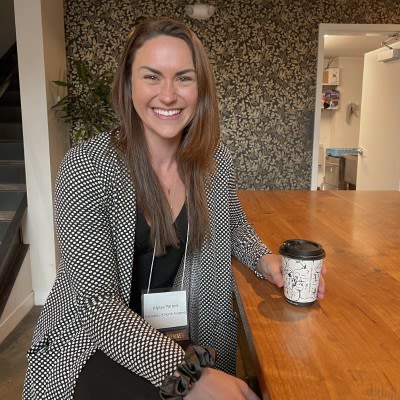
Clinical Assistant Professor, Kinesiology
Clinical Assistant Professor, Kinesiology
Alyssa Parten
Alyssa Parten is a Ph.D. candidate in exercise science and health promotion graduating in August from the University of North Alabama. She owns a powerlifting education and coaching business, Ladybeef Strength Co., where she works with competitive and recreational powerlifters. Over the last decade, she has accumulated years of coaching and training experience, a B.S. in exercise and sport science and minor in nutrition from The University of Alabama, a dual concentration master’s degree in Human Movement Science and Strength & Conditioning from Concordia University Chicago, hours of continued education, and a handful of professional certifications, including the NSCA-CSCS and NASM-CES.
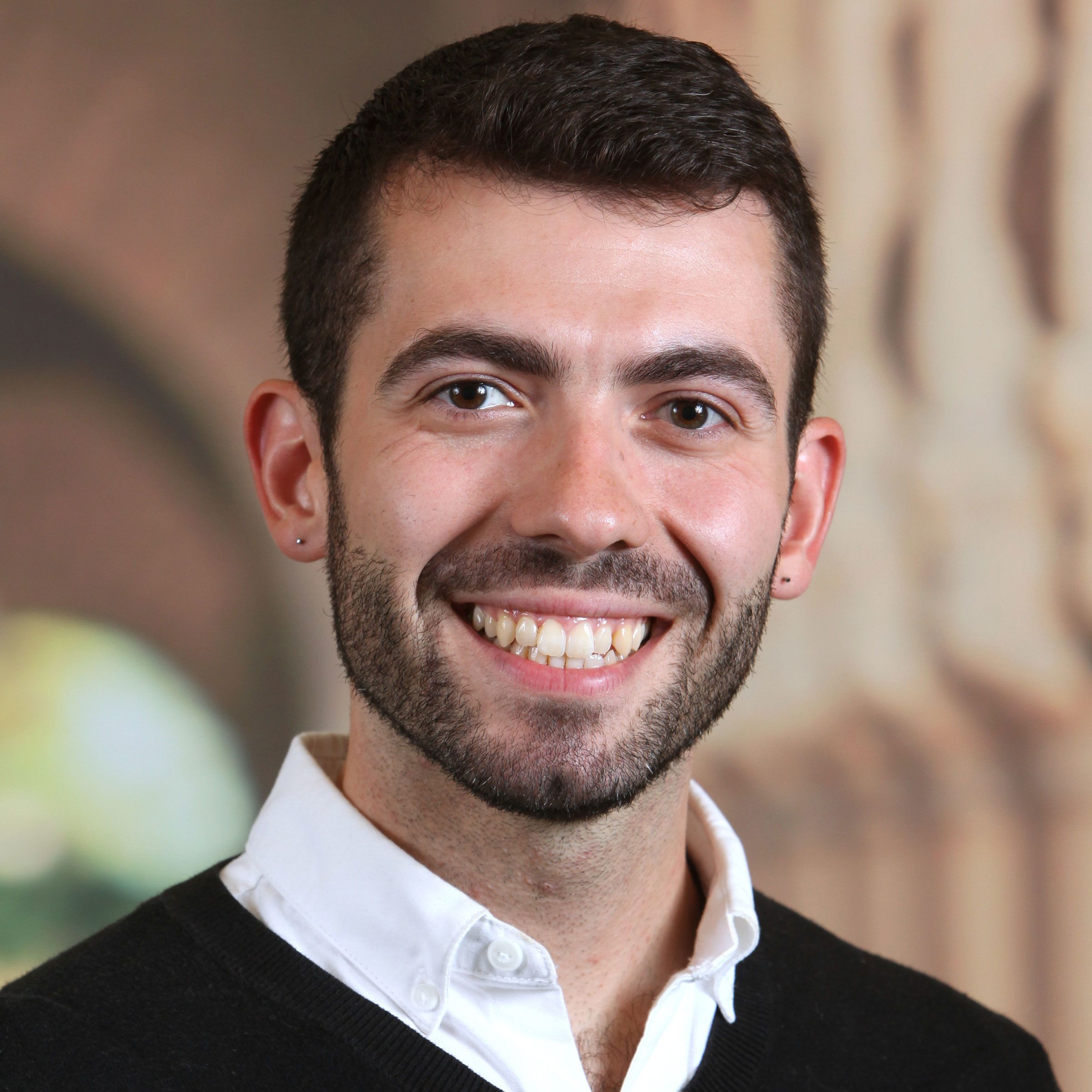
Assistant Professor, Science Education
Assistant Professor, Science Education
Dr. Daniel Pimentel
Dr. Daniel Pimentel earned his doctorate in science education, learning sciences, and technology design from Stanford University. He also received a B.S. in Biology and an M.Ed. in Secondary Education from Boston College where he was a Donovan Urban Teaching Scholar, Sharp Urban Teaching Scholar, and Science Educators for Urban Schools Fellow. Dr. Pimentel previously taught middle school science and high school chemistry in New York.
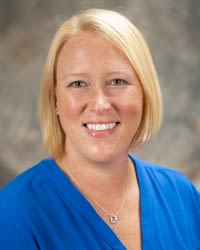
Clinical Assistant Professor, Kinesiology
Clinical Assistant Professor, Kinesiology
Dr. Kimberly Shaw
Dr. Kimberly Shaw earned her doctorate in exercise physiology from The University of Alabama in 2013. She also received her bachelor's degree in athletic training from the University of South Alabama and a master's degree in exercise physiology from Auburn University. Shaw has taught at the college level for more than 16 years, previously serving as an assistant professor of kinesiology at the Mississippi University for Women.
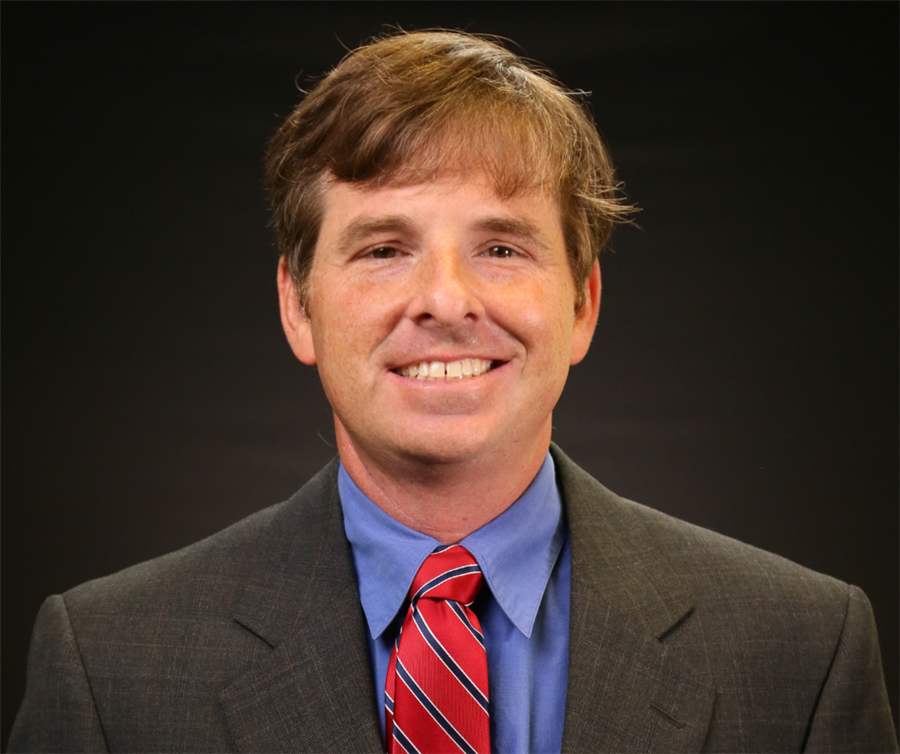
Instructor, Educational Leadership
Instructor, Educational Leadership
Benjamin White
Benjamin White received his master's degree in education and his teaching certificate from Tennessee State University. He was previously principal of Cottondale Elementary School and has also taught elementary school classes in both Tennessee and Alabama.
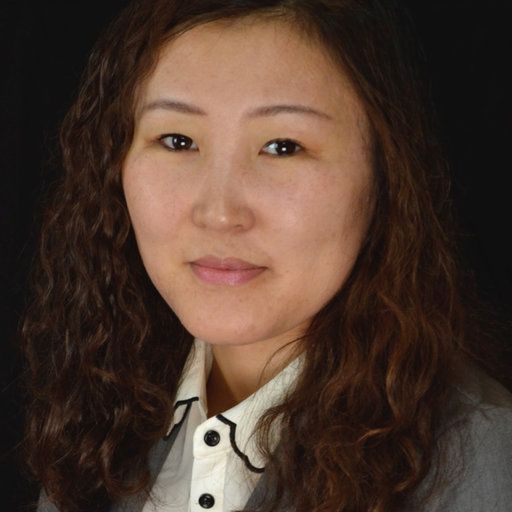
Clinical Assistant Professor, Kinesiology
Clinical Assistant Professor, Kinesiology
Dr. Battogtokh "Togy" Zagdsuren
Dr. Battogtokh "Togy" Zagdsuren earned her doctorate in kinesiology from The University of Alabama. In 2022, she received an Outstanding Research by a Doctoral Student honor for her work with the UA Department of Kinesiology and has also worked as a graduate teaching assistant. Zagdsuren also earned her master's in kinesiology from Western Kentucky University.
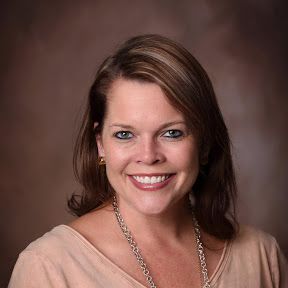
New director Allison Miller has bright plans ahead for Gadsden Center
The UA alumna has 20 years of experience in education and administration
The University of Alabama Gadsden Center found its new director this spring in Allison Miller, former K-12 administrator, instructional specialist, and teacher.
Miller began her new role as director of expanded learning and community support on May 8, bringing with her 20 years of educational and administrative knowledge and experience. She already has big plans in mind for the future of the center as well as the community services and outreach that it provides.
“There are a lot of different resources at the UA Gadsden Center. We house the Alabama Expanded Learning Alliance,” Miller said, which is a resource for quality afterschool and summer programs across the state.
Accepting this position has been a homecoming of sorts, and in more than one way. Not only is Miller now closer to her family, but, since she is an alumna of the Gadsden Center, there were some familiar faces waiting to welcome her back.
“I'm very blessed to have this opportunity to work for The University of Alabama, to be home, and to be able to support our community,” she said.
The UA Gadsden Center offers a variety of services and engagement possibilities for the community and surrounding areas, such as educational programs for young people and adults, spaces for business conferences, workshops, and events, and facilities that can help advance research in early childhood education and development. It also includes professional development opportunities for early childhood educators, students, and pre-service teachers.
“Etowah County has a lot to offer,” Miller said. “We are seeing a lot of growth in our area, and I want to do whatever I can to support that growth and support the learning of our kids.”
A graduate of UA and Jacksonville State University, she has worked in all aspects of education throughout her career and with students of all ages – from elementary school up through high school and, now, at the pre-kindergarten and college levels. Miller also previously served as the Region V president of the Alabama Association of Elementary School Administrators.
“What inspired me to go into education were the teachers I had who were supportive of me, pushed me, and made sure I was doing my best and trying my best. … I chose education because of wanting to help,” she said.
And there is a sense of fulfillment that accompanies this work.
“You're adding to your community. You're adding to the success of your community, and you're creating successful citizens,” Miller said. “That is going to contribute to our society, and what better way to help than to be in education?”

The center's pre-kindergarten program offers 4-year-olds in and around Etowah County a high-quality, inclusive learning experience. (Adobe Stock photo)
The center's pre-kindergarten program offers 4-year-olds in and around Etowah County a high-quality, inclusive learning experience. (Adobe Stock photo)
“It is important to make sure that we are meeting the highest standards possible. We want to be able to provide high-quality pre-K for our kids here in Etowah County and surrounding areas.”
The Early Learning Initiative (ELI), another program at the center, provides first-class pre-kindergarten for the surrounding areas. This is a cause that is paramount and one that Miller takes to heart.
“It’s so important for (our children) to get a strong start to education,” she said.
ELI’s pre-K program, which is in its second year, offers high-quality learning experiences for 4-year-olds at zero or minimal cost to their families. This opportunity was made possible through partnerships with multiple entities: the UA College of Education, the Alabama Department of Early Childhood Education, Alabama First Class Pre-K, and the City of Gadsden.
The program currently has two pre-K classrooms and serves 36 students, though a waiting list for prospective students will be made available to parents as the classes continue to fill. The objective is to eventually offer additional classes, better supporting families in the community.
Miller said she is excited to see the program’s progress over the upcoming school year.
“I see that we can grow,” she said. “My goal is to partner with other school systems around the state and our area (and discuss) how we can support each other in order to make a successful learning experience for all of our students.”
Other plans for the center include expanding the pre-K program to enroll children younger than 4, organizing summer literacy programs, as well as offering additional STEM and afterschool activities, to name a few.
One of Miller’s primary goals is to achieve national accreditation in the next few years, which would make the center the first educational facility in the area to earn this recognition.
“It is important to make sure that we are meeting the highest standards possible,” she said. “We want to be able to provide high-quality pre-K for our kids here in Etowah County and surrounding areas.”
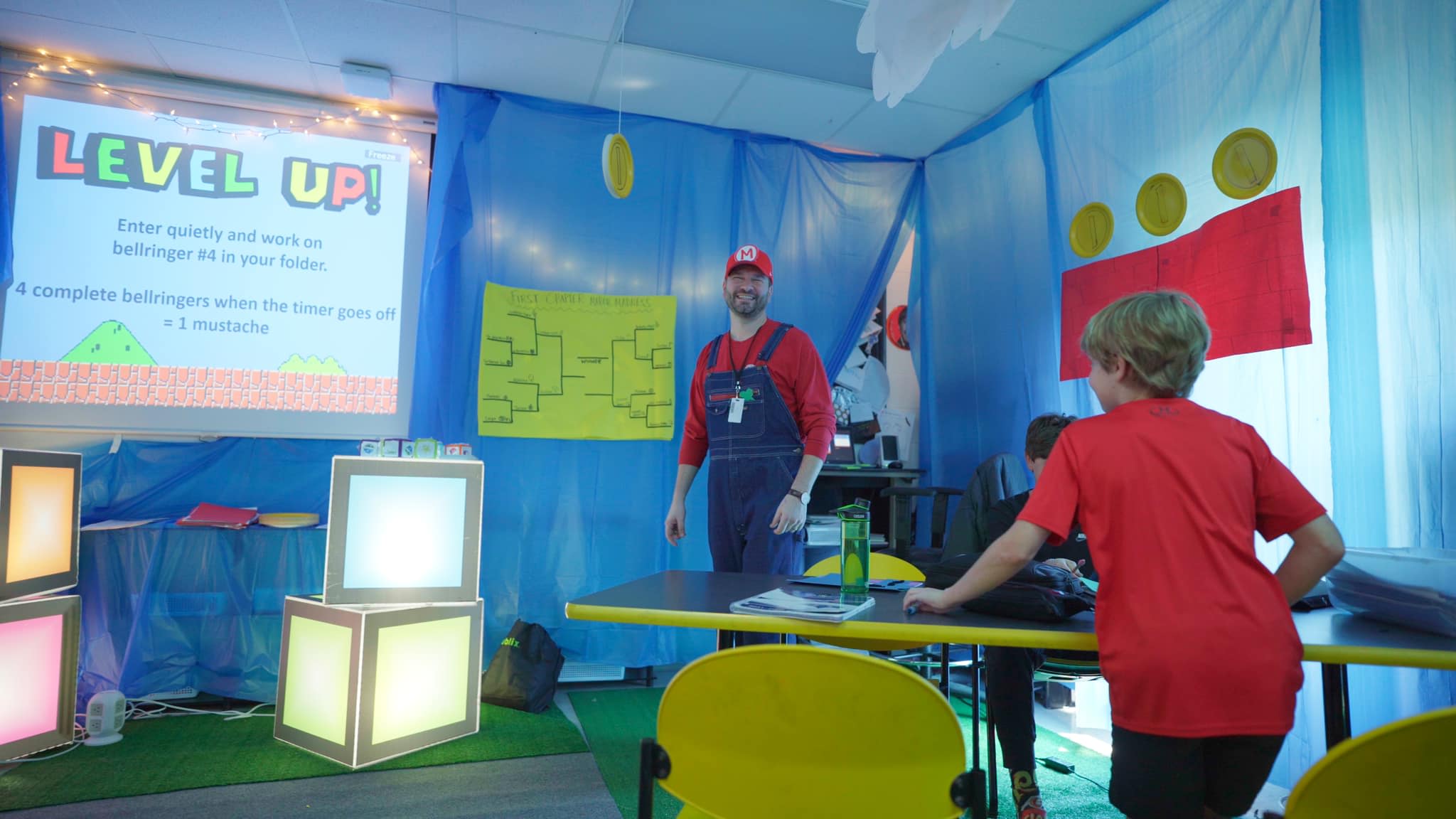
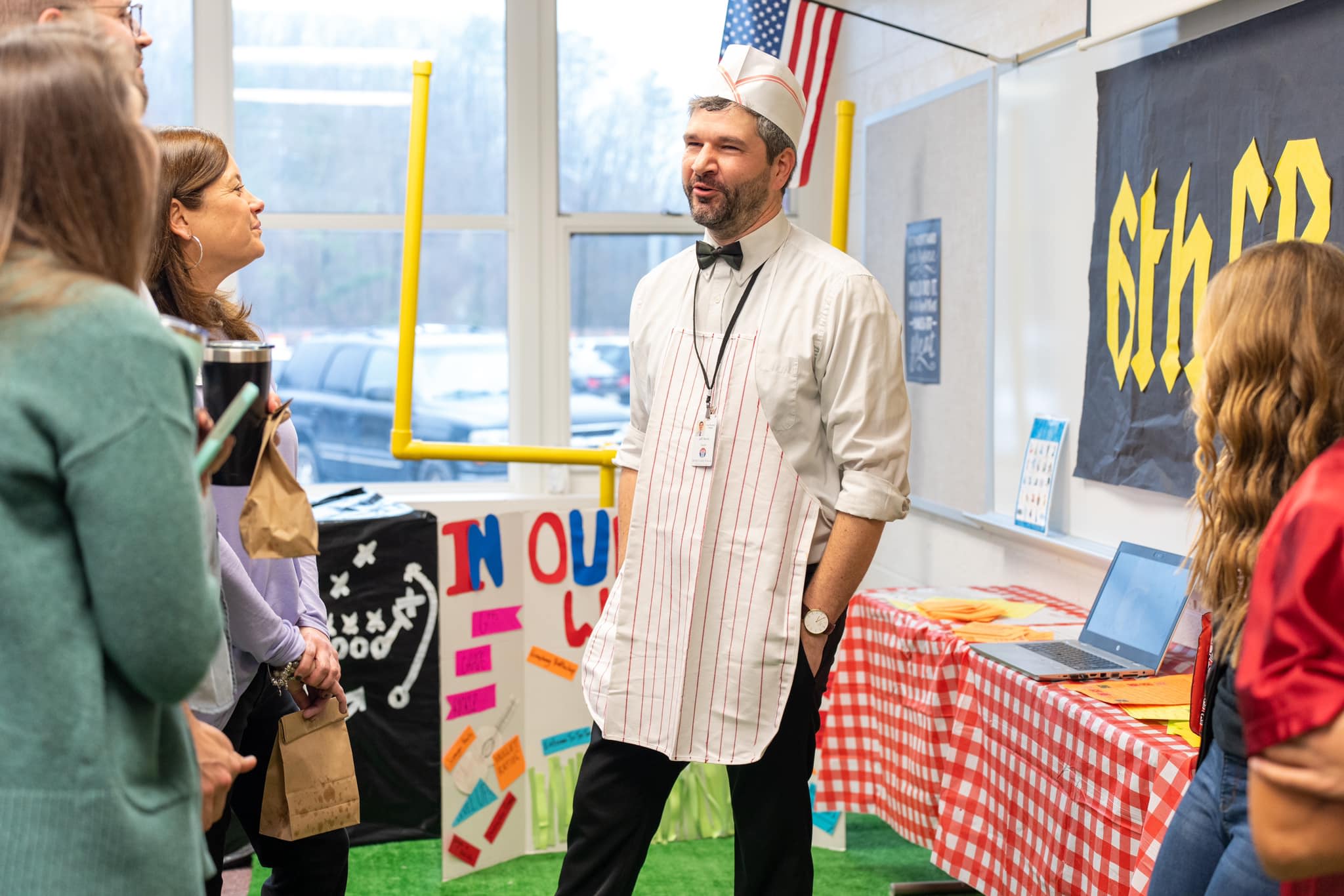
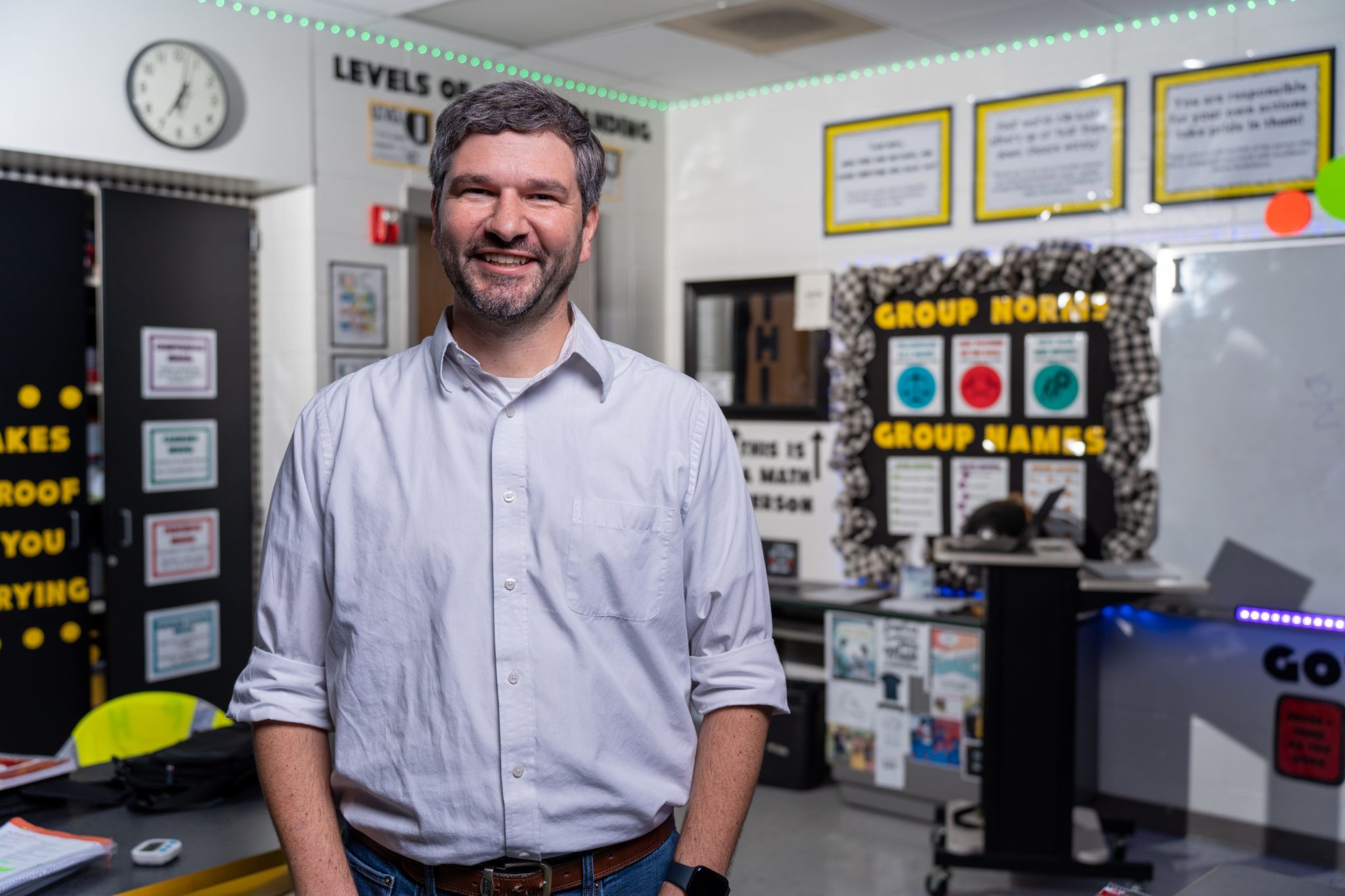



2005 graduate Jeffrey L. Norris named 2023-2024 Alabama Teacher of the Year
Norris teaches math at Oak Mountain Middle School
Jeff Norris, a sixth-grade math teacher from Oak Mountain Middle School, has been named one of the 16 finalists for Alabama Teacher of the Year.
The Alabama State Department of Education announced the 16 finalists on April 5. According to the ASLDE press release, “16 outstanding educators who personify excellence have been selected as finalists for Alabama Teacher of the Year. Each excels in the classroom and inspires students through innovative instructional techniques. The finalists emerged from a highly professional group of more than 150 top educators who submitted applications for this state honor.”
Norris was one of three teachers honored in December as overall “Teachers of the Year” for the Shelby County School District. While he was named Shelby County’s Middle School Teacher of the Year, he competed in the Elementary Teacher of the Year category for the state award due to his certification being in elementary education K-6. There are two finalists from each of the eight state school board districts. Norris was selected as one of two finalists from District III. Kevin Pughsley, a former Shelby County teacher who now teaches at Berry Middle School in Hoover is the other District III finalist.
Norris said when he thinks about individuals who have influenced him throughout his life, he automatically recalls many of his favorite teachers.
“I experienced first-hand the impact of quality educators who cared about their students and wanted to leave a lasting impression,” Norris said. “I do not take my position lightly, because I know I have this same ability.”
As a teacher, Norris plans lessons that keep student engagement at the forefront and will admittedly go to extreme lengths to “hook” his students. He has recently attended professional development, completed research, and implemented the concept of classroom transformations – a physical transformation of the classroom environment to set the tone for learning that immediately grabs students’ interest while providing a theme that ties standards to activities.
Norris described dressing up as the video game character Mario and transforming his classroom into the Super Mario video game during a series of lessons entitled “Level Up” from a previous year teaching Advanced ELA.
This year, his math students have completed a “Fraction Things” unit where the classroom transformation was based on the popular television show “Stranger Things.” Students practiced math problems in “the Upside Down” underneath their tables while also incorporating two other well-known locations on the show – the Scoops Ahoy ice cream shop and Will Byers' fort, Castle Byers.
Students have also enjoyed waffles and learning how to add, subtract, multiply, and divide decimals in the “Decimal Dinner” and learning long division during the “Touchdown Division” unit which included a 10-foot goal post constructed by a parent. Most recently, Norris’ class joined the entire sixth grade to participate in a “Sixth Grade Rocks Day” where the math teachers helped students practice “Mullet Ratios” by finding the best “business in the front to party in the back” ratio.
In addition to classroom transformations, Norris has become a fan and self-proclaimed “missionary” of the “Build Thinking Classrooms in Mathematics” book by Peter Liljedahl. In the book, Lijedhal outlines and advocates for fourteen practices to instill a culture of thinking in classrooms.
“My classroom and school are my mission field, and I use every opportunity available to have a positive impact on my students’ lives,” Norris said. “I hope the passion and enthusiasm I have for teaching are contagious.”
“Todd Whitaker says, ‘The best thing about being a teacher is that it matters. The hardest thing about being a teacher is that it matters every day.’ Each day is unique and may bring challenges, but it also brings an opportunity for growth, learning, and perseverance. I am proud and honored to represent Oak Mountain Middle School, Shelby County Schools, and teachers around District 3 who love what they do, the students they teach, and who inspire greatness each day,” Norris said.
Project helps shift Choctaw County Schools in positive direction
Grant-funded program implements system, resources to improve student behavior

Over the past four years, a program aimed at improving school climate and student behavior has been successfully implemented into schools in the Choctaw County school district. Though the schools have faced their share of challenges – from a period of turnover and transition to COVID-19 and the difficulties that come with virtual learning – they have persevered and accomplished what the School Climate Transformation project intended.
With support from a five-year $2.8 million grant provided by the U.S. Department of Education in 2019 and partnerships with the Center for Interconnected Behavioral and Mental Health Systems (CIBMHS) and The University of Alabama Department of Special Education and Multiple Abilities, Choctaw County Schools began training faculty and staff to incorporate a three-tiered support system using positive behavioral interventions and supports (PBIS) and social-emotional learning framework as well as other resources that will positively influence its students.
CIBMHS Director and UA Professor of Education Dr. Sara McDaniel assisted with writing the grant and is one of the project’s principal investigators while Clinical Instructor DeAna Byrd is project director for both the School Climate Transformation program and CIBMHS and Assistant Professor of Communication Studies Dr. Anneliese Bolland serves as the project evaluator. Dr. Holly Morgan at the West Alabama Regional In-Service Center facilitates the project and connected Dr. McDaniel with the Choctaw County Schools federal programs director, leading to the three of them organizing the grant while being able to target specific needs of the schools.
As project director, Byrd assisted in professional development in each school and coaching teams of faculty and staff through the implementation process so they could then teach the methods to the remaining school employees.
“I think, with the educators, it provides them with the framework to make things consistent so everyone's not doing it a different way,” Byrd said. “Those kiddos that have their social-emotional behavioral issues, they thrive off the consistency.”
Choctaw County is very rural and due to poverty issues is considered a high-needs area. This can affect school climate as well as student performance. Choctaw County Elementary, Choctaw County High, Southern Choctaw Elementary, and Southern Choctaw High schools serve roughly 1,242 students per year, according to the project abstract. With high rates of attendance, the schools have also faced a plethora of behavior issues and disciplinary incidents in addition to substance abuse cases.
“The communities in Alabama that are rural also tend to be forgotten by not just researchers, but implementers,” Dr. McDaniel said. “… I think it's a really interesting partnership, and (Choctaw County) welcomed us with open arms. So, that was the other end of it. We were really interested in helping them, but they also had to be interested in allowing us in and allowing us to be a part of the community and the partnership.”
Overall, the program framework is the same, though it is left up to the individual schools to determine what their principal needs are and what the focus of the positive behavior curriculum should be. The support system features three tiers to address those needs and help determine which students in the school have behavioral issues and need additional support and assistance. The students’ strengths and difficulties are then identified, and a specialized behavior plan is designed for each individual student, though parental permission does need to be obtained before the behavior plan is set forward. Once the initial training is complete, Byrd said, a school-based project director oversees the school’s progress.
“I do know (the Choctaw County School faculty and staff) are super proud of themselves, and they have every right to be with the progress that they've made,” Byrd said. “They’ve overcome the challenges of a new superintendent, having to change staff multiple times, and they've been able to maintain and are doing so well at it.”
Through the grant funding, the school district has been able to hire mental health-based behavior specialists for each of its four schools who work with students having behavioral issues while also forming relationships with them that will positively influence their performance in the classroom setting.
“I recently came from a district where they only had one mental health service coordinator,” said Dr. Jamara Wright, Choctaw County’s new federal programs director.
“I think (the program has) been vital. I do believe if they didn’t have this here that there would have been a lot of tragedies. It has been, I say, the heartbeat of this school system.”
“There is a huge difference in what they did and what the school-based therapists do here,” she said. “... These people are at the schools five days a week, all day. They actually get to build those relationships. The former federal programs director shared some stories with me of how they have literally saved lives where students were suicidal – just huge improvements. The students feel comfortable coming to them.”
Disruptive and disciplinary behavior has decreased across the schools since the program began four years ago, as has attendance, academic performance, and self-worth, said Southern Choctaw Elementary School Behavior Specialist Janice Chapman.
“(Because of COVID) this year is really the first year that we have worked with the students face to face,” she said. “Since the inception of the program, we have been able to implement a successful crisis protocol policy that has been instrumental in helping students that have social-emotional (needs), suicidal ideations, and homicidal ideations.”
The behavior specialists engage with parental figures and the community – by attending basketball or football games and other events – which can influence positive behavior to continue in the home setting while also helping parents realize just how important mental and emotional health is.
“Now they know that when Little Johnny comes to school, he has a safe place. Not only will academic needs get met but also social-emotional needs, the whole child,” Chapman said. “That’s important because if Little Johnny is having triggers or behavioral meltdowns, don't even try to think that he's going to focus on anything academic, until you can get him stabilized.”
Different programs, such as drug and alcohol prevention and intervention, have also been incorporated into the schools in an effort to increase students’ safety and better their health.
“I think (the program has) been vital,” she said. “I do believe if they didn’t have this here that there would have been a lot of tragedies. It has been, I say, the heartbeat of this school system.”
The other behavior specialists Latisha Spencer, Tywana McGrew, and Lasandra Hill agreed. There was resistance from some of the students in the beginning, however.
“… They thought they were coming (to the principal’s office) because of discipline, and we were going to punish (them),” Chapman said. “So, we established that relationship to let them know – one of the key things we always tell them – we're not disciplinaries. We give you the tools and the resources that you can use to be successful in the school system. Now, it's up to you whether you apply those resources that we provide to building that social-emotional state. The whole child, we’re looking at the whole child.”
With these “positive office referrals,” students are now called in to be praised for meeting expectations or to receive a “Shine Report” for good behavior. Sometimes parents will even get a phone call telling them that their child did something they should be proud of.
“Just having that positive feedback is really good and implementing positive things,” Chapman said.
Everyone involved with the School Climate Transformation project is proud of the progress that has been made in Choctaw County Schools over the past four years.
“It makes my heart so happy. I would have probably never have known anyone in Choctaw, Alabama, without this project, and without (Dr. Morgan) connecting us, so I'm just glad to know the community,” Dr. McDaniel said. “They are hardworking educators, they're super smart, and they care so much. Wherever I go in Alabama, where we are able to work with educators, it always makes me happy, but this project made me extra happy because they were getting so much support. This grant was able to provide the small community with support that they really needed.”

Program will give master’s students skills, experience needed for career in school-based mental health
Through interdisciplinary partnership, project aims to help students in high-needs Tuscaloosa City schools
Next spring, the College of Education’s Department of Educational Studies in Psychology, Research Methodology, and Counseling – in collaboration with the UA School of Social Work, the Capstone College of Nursing, and Tuscaloosa City Schools – will begin a federal grant-funded initiative aimed at addressing the mental health needs of students attending high-needs schools within Tuscaloosa City Schools. The initiative is part of the Department of Education’s Mental Health Service Professional (MHSP) Demonstration Grant Program.
Over five years, Project PROMISE – which stands for Promoting Mental Health Services and Equity – will educate 40 University of Alabama master’s students specializing in school counseling and social work and equip them with the skills and firsthand experience they need to be school-based mental health professionals working with students in high-needs schools.
The $5 million grant is dedicated to helping fill gaps that exist in Tuscaloosa City Schools’ education facilities. Through an interdisciplinary approach, project scholars will learn to provide proficient support and holistic mental health services to city school students in K-12.
“(At) the University and our College in particular, the philosophy has always been to conduct scholarship that is consequential to the community,” said Dr. Tongi Mugoya, Project PROMISE Principal Investigator and Associate Professor of Rehabilitation Counseling.
With faculty members from the College of Education, School of Social Work, and College of Nursing involved, the interdisciplinary collaboration fueling this initiative makes it stand out, he said.
“(It’s important) for our students to recognize that even though you may have specialized training as a school counselor, social worker, or even as a nurse, your goals are the same – to improve the mental health outcomes of students,” Dr. Mugoya said. “We need to start that interdisciplinary work. That's why it is important for us to think about approaching our teaching from an interdisciplinary perspective.”
Project PROMISE Co-principal Investigator and Professor of Social Work Dr. Hee Lee noted that approximately one quarter of the state’s children have at least one emotional, developmental, or behavioral condition, and, in the last year, close to 40% of high school students have dealt with signs of depression. Due to the shortage of school-based mental health providers, however, most students in need of support don’t seek it in their schools. Dr. Lee is excited about the program and how it will address this issue.
“Our project is to combat these dire needs of mental health professionals and improve mental health outcomes in Alabama, especially among school-aged children in the Tuscaloosa City Schools district, by working with the interdisciplinary team,” she said. “We will increase the number and diversity of highly qualified school-based mental health professionals, including social workers and school counselors, who can properly assist students in high-needs schools.”
School counseling students will comprise one cohort while social work students make up the other, but their commitment as school-based mental health professionals is the same: Provide students with services that will nurture and better their mental health.
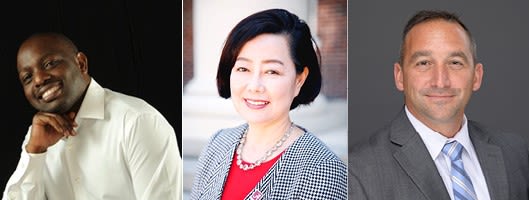
From left: Project PROMISE Principal Investigator Dr. Tongi Mugoya, Co-principal Investigator Dr. Hee Lee, and Tuscaloosa City Schools Superintendent Dr. Mike Daria
From left: Project PROMISE Principal Investigator Dr. Tongi Mugoya, Co-principal Investigator Dr. Hee Lee, and Tuscaloosa City Schools Superintendent Dr. Mike Daria
“Something like this helps us to be in the community, provide services in the community, and improve the lives of the people that we're working with in the community,” Dr. Mugoya said.
As more and more people are realizing the negative roles poor mental health can play in society, it is pivotal to strive to address students’ needs as early as possible.
Another vital objective of the program is increasing the diversity of mental health professionals within high-needs schools as the majority of students are more likely to be from minority population, live in high poverty, or have low (supplemental education services), according to statistics, he said.
“It is important to have diverse school-based mental health professionals as it has been shown in research that when talking with someone who has a similar background, the students are more likely to share whatever is going on with them,” Dr. Mugoya said.
As part of the partnership, Tuscaloosa City Schools will identify the high-needs schools where the project scholars will complete their field experience. The project scholars will also be teamed with a mentor who works in their assigned school and will provide guidance, share professional experience, and ensure they are meeting their field experience requirements. The goal is for all program scholars, once they’ve completed training, to apply their specialized knowledge at a high-needs school, whether in Tuscaloosa City Schools or another area requiring assistance.
“We know that in order for all students to be successful, they need quality learning experiences and equally strong support,” said Dr. Mike Daria, Tuscaloosa City Schools superintendent. “School mental health professionals are an essential part of our success. Project PROMISE is a collaborative effort that will bring diverse candidates to the school social work and school counseling field who will become fully prepared to meet the needs of our students and their families.”
“I know where I am. I know what it feels like to be a student in that kind of setting. Having the ability to also assist someone to move forward like that — it feels good to have that kind of opportunity.”
— Dr. Tongi Mugoya
The grant funding will make it possible for Project PROMISE to pay the tuition of each of the program’s master’s students as well as the salaries of two graduates from each cohort to work within Tuscaloosa City Schools for two years.
“The Tuscaloosa City Schools actually will endeavor to have those people continue and work with them beyond the grant,” Dr. Mugoya said.
As part of the project, undergraduate students from area HBCUs will be invited to attend an institute on campus to learn more about school-based mental health professions and the project itself.
“We are excited about this program, about the project, and the buy-in we will get from the project scholars, because in the end, they are the engine,” he said, adding that he is looking forward to the start of the project and hopes it will spark the students’ interests in efforts to address mental health issues in high-needs districts.
Dr. Mugoya is passionate about lifting the lives of those who face more barriers than others through his work, and as someone who received some assistance from scholarships and took part in assistantships while attending graduate school, he said he knows precisely how crucial opportunities like Project PROMISE can be.
“I can definitely say that I've been lucky to be where I am” he said. “I know where I am. I know what it feels to be a student in that kind of setting. Having the ability to also assist someone to move forward like that – it feels good to have that kind of opportunity.”

Carlson Coogler
Carlson Coogler
Carlson Coogler receives 2023-2024 fellowship with the SEC Emerging Scholars Program
Carlson Coogler, an education research doctoral candidate, has been named an SEC Emerging Scholar Program Fellow for 2023-2024. She will join six other University of Alabama doctoral students as well as doctoral and post-doctoral students from the other 13 SEC institutions.
Coogler’s fellowship includes a scholarship and will provide her with finances she can use to fund research and conference travel. This fall, she and other program members will be required to attend the SEC Emerging Scholars Workshop at the University of Arkansas where they will take part in sessions aimed at preparing individuals for academic jobs in the SEC. They will also be able to network with representatives from each of the SEC universities and learn more about what they can expect as a new faculty member at that institution.
UA fellows will also get the chance to participate in career development activities on campus, working with their peers as well as Emerging Scholars liaisons Dr. André Denham, associate dean for Academic Affairs in the Graduate School; and Dr. Utz McKnight, associate dean for Diversity, Equity, and Inclusion in the College of Arts & Sciences.
The SEC Emerging Scholars Program was created to inspire top scholars who are interested in higher education careers to consider mentorship and employment within the SEC. This fellowship provides doctoral students, and some post-doctoral researchers, with professional development opportunities that can help prepare them for a future career as an SEC faculty member.
To learn more about the program, please visit www.thesecu.com/programs/sec-emerging-scholars/. You can also find Coogler’s Instagram, which is dedicated to art and art research, at @course_of_inquiry.
Dr. Cory Callahan receives prestigious Fulbright Scholar Award
Dr. Cory Callahan was recently selected as a 2023-2024 Fulbright U.S. Scholar by the U.S. Department of State and the Fulbright Program.
Through this distinguished fellowship, he will have the opportunity to teach as well as conduct academic research and projects in the Republic of Kosovo.
“This Fulbright award is a fantastic honor that, in accepting it, I hope highlights the talented colleagues and students I work with each day at The University of Alabama and the supportive family I am blessed with, especially my wife Amy,” said Dr. Callahan, an associate professor in secondary social science. “This award recognizes all of our important work and sacrifices.”
The Fulbright U.S. Scholar Program provides recipients in a variety of fields the chance to conduct their work in one of more than 135 countries.
The engagement that accompanies these awards serves to elevate the profile of scholars’ home institutions while establishing and maintaining communication and relationships with the host countries.
Scholars also walk away from these exchange experiences “with enhanced skills, new connections, and greater mutual understanding,” according to the Fulbright Scholar Program website.
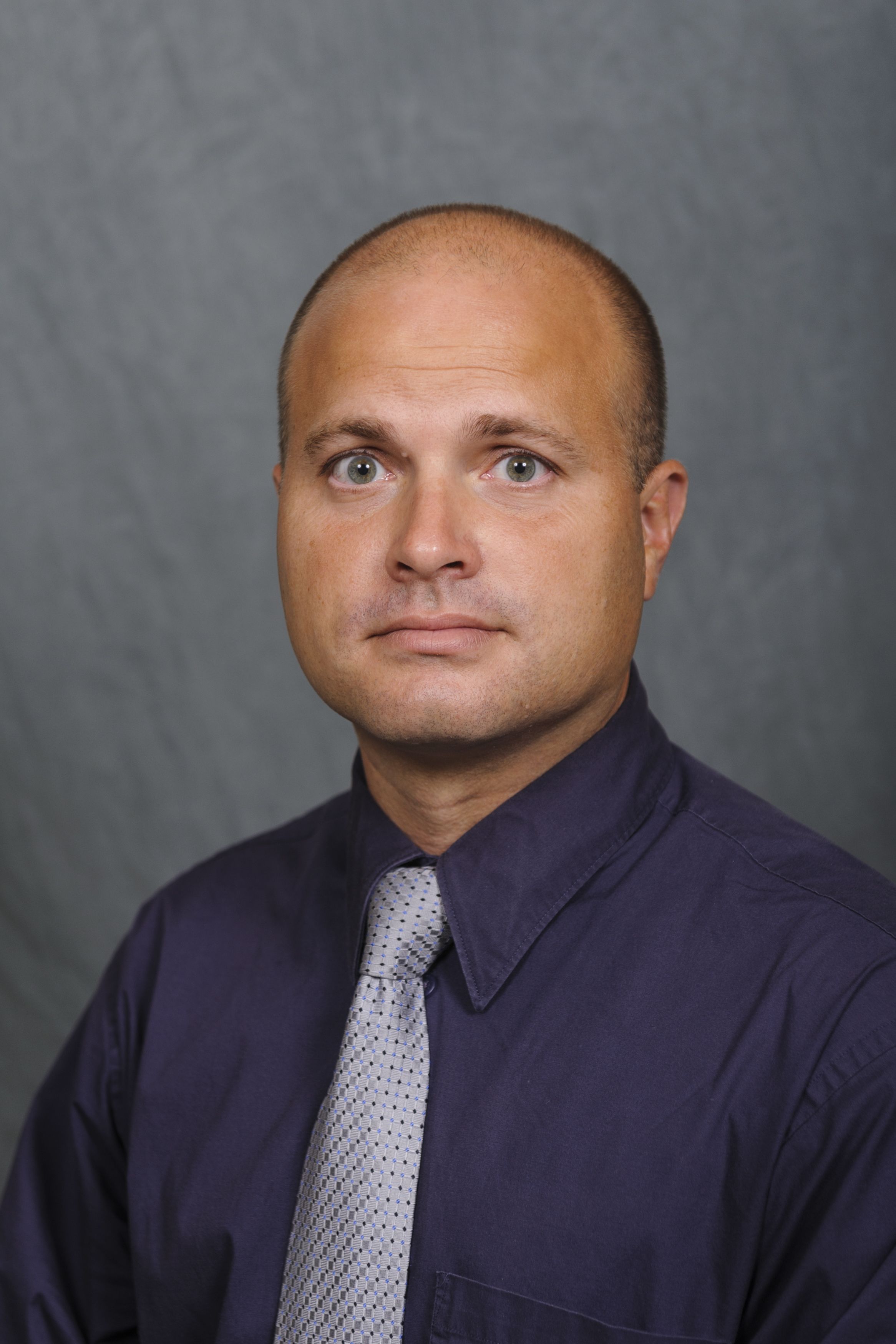
Dr. Cory Callahan
Dr. Cory Callahan



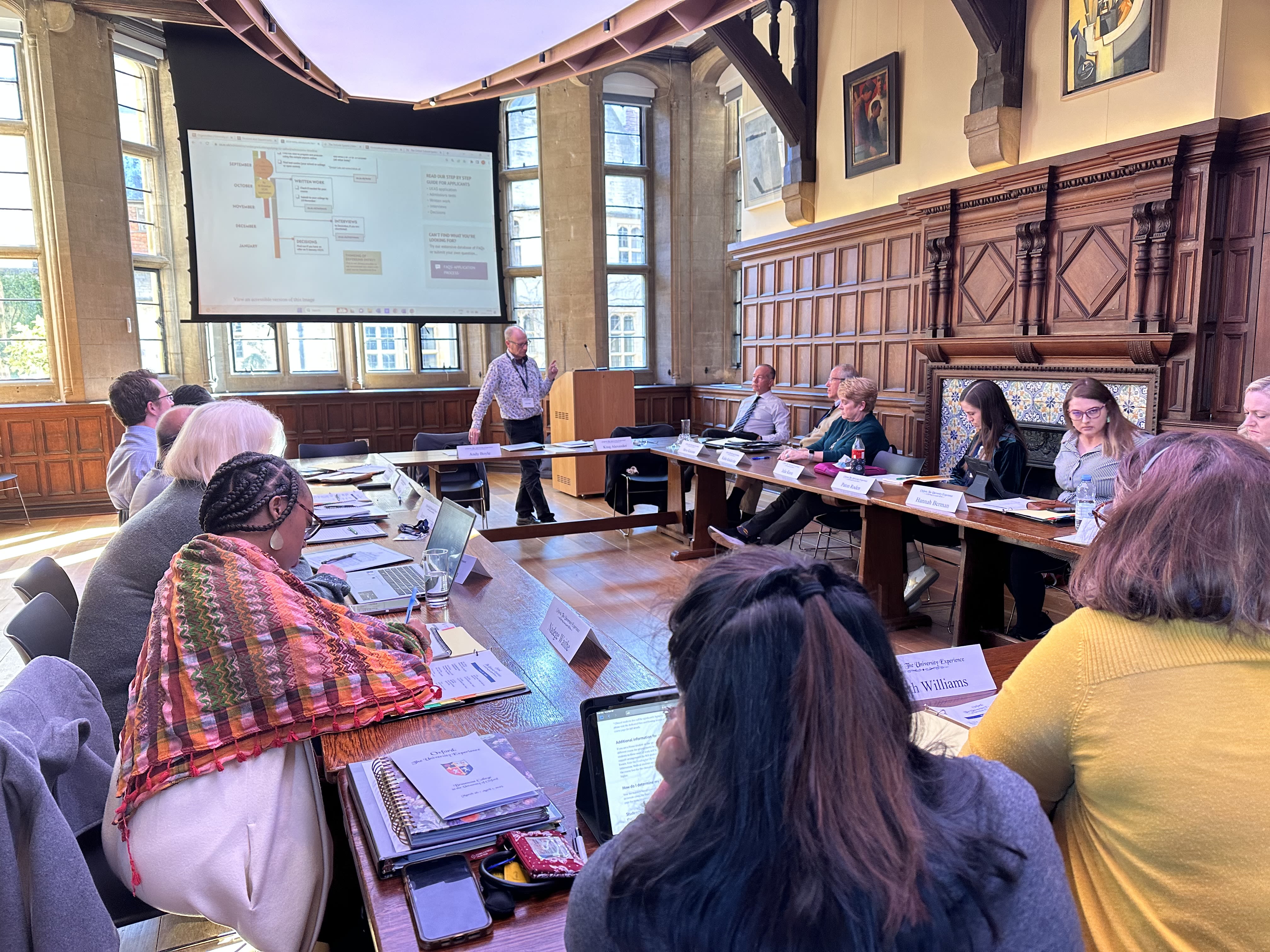
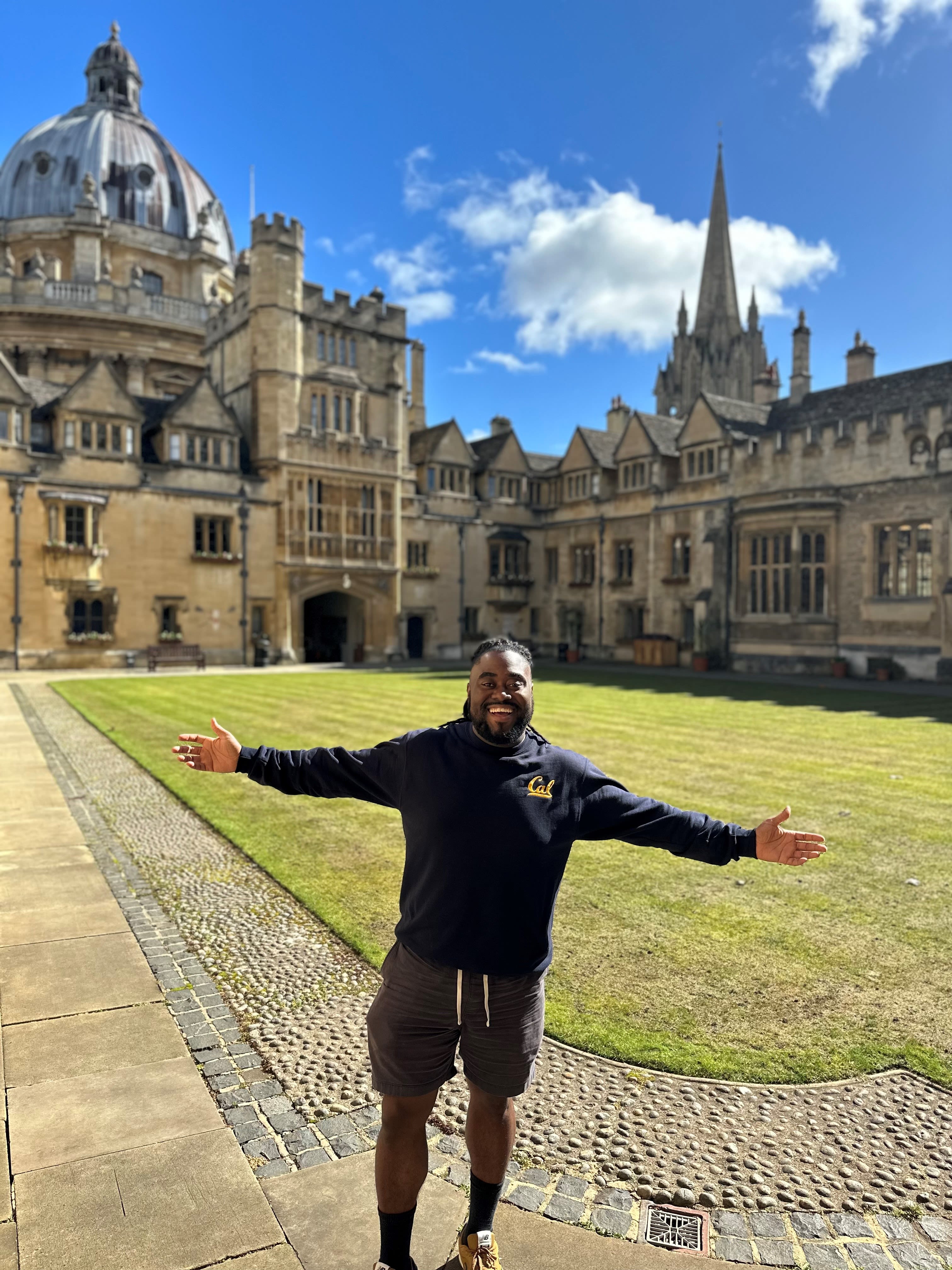
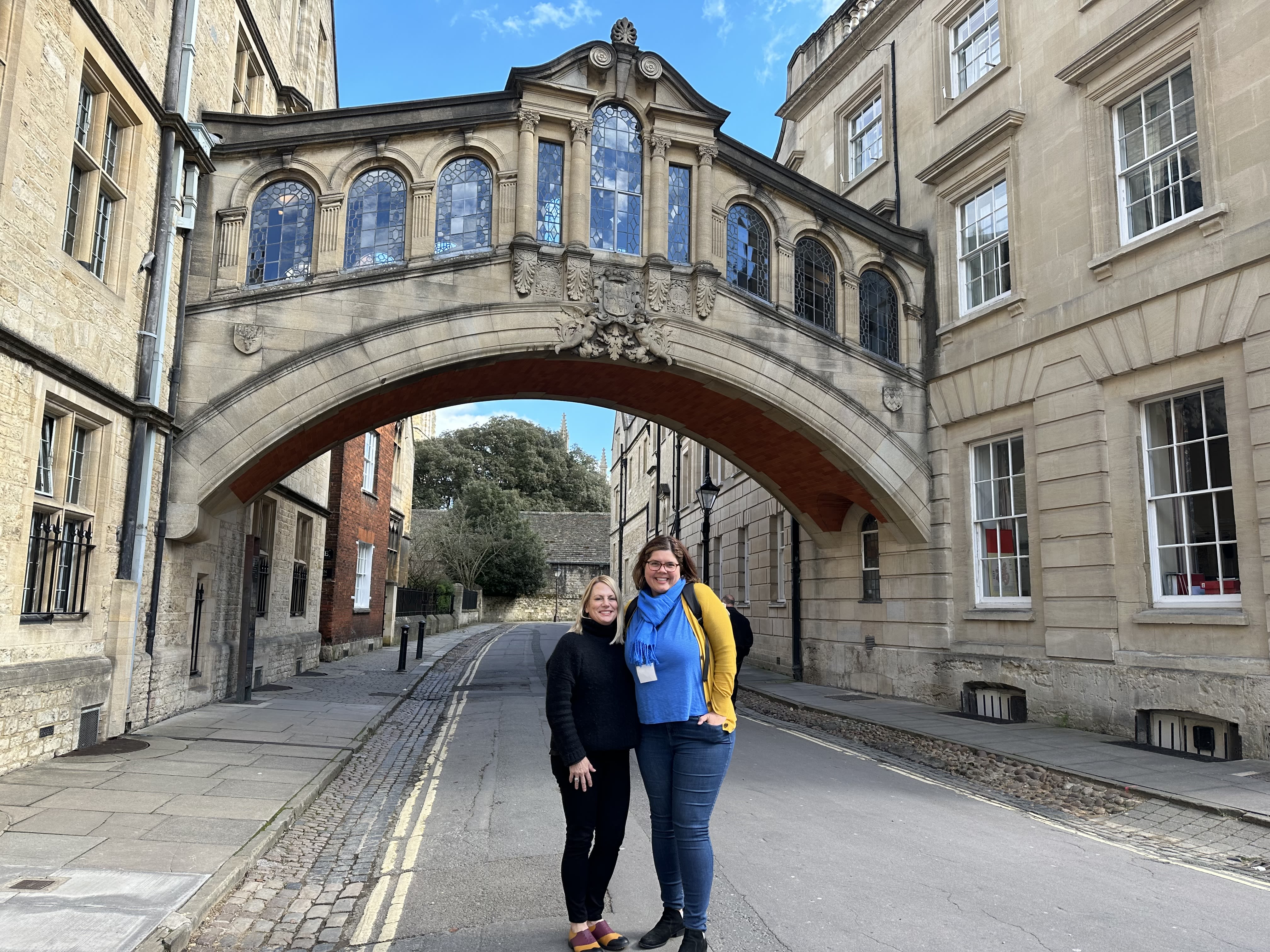
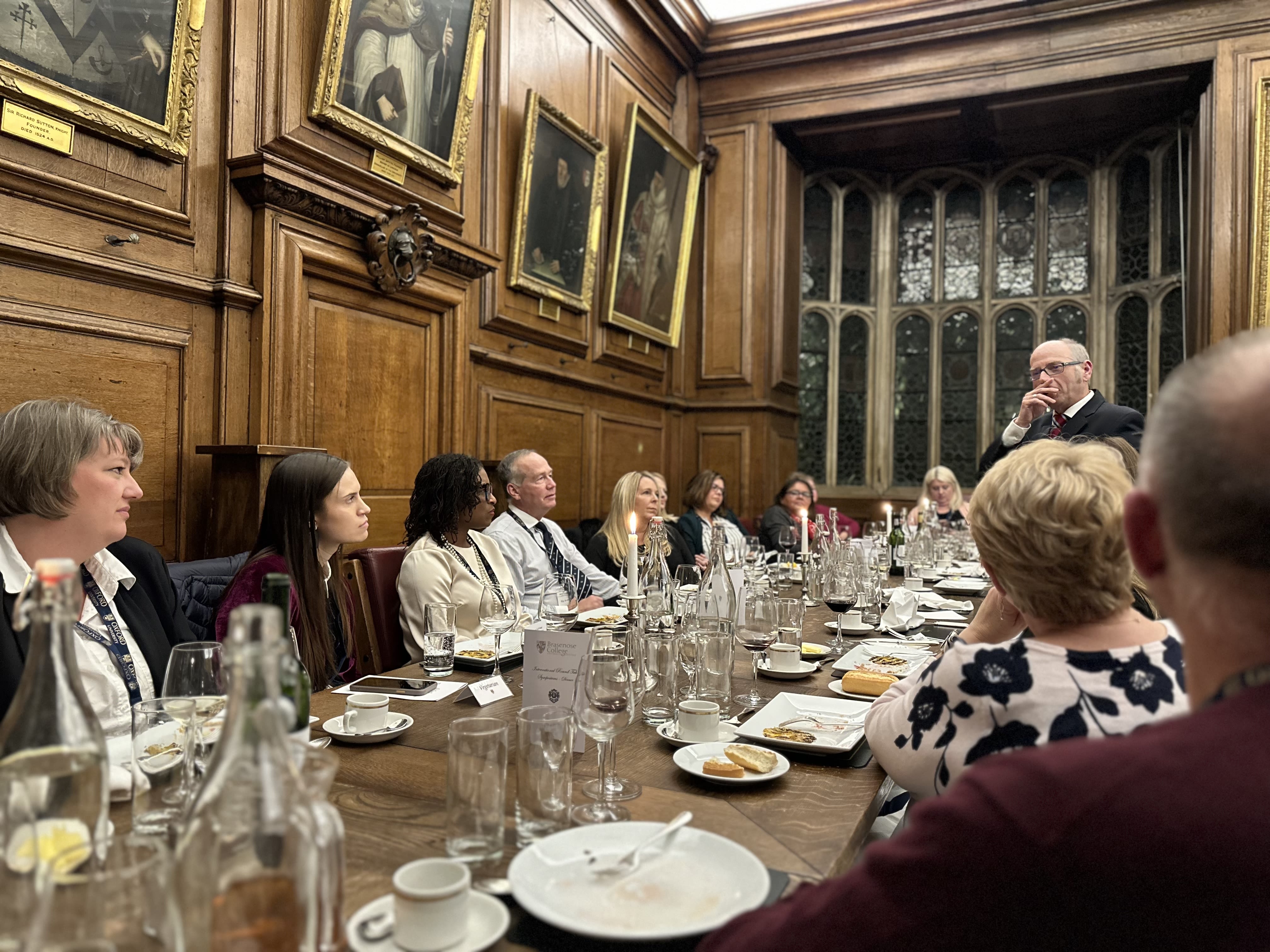
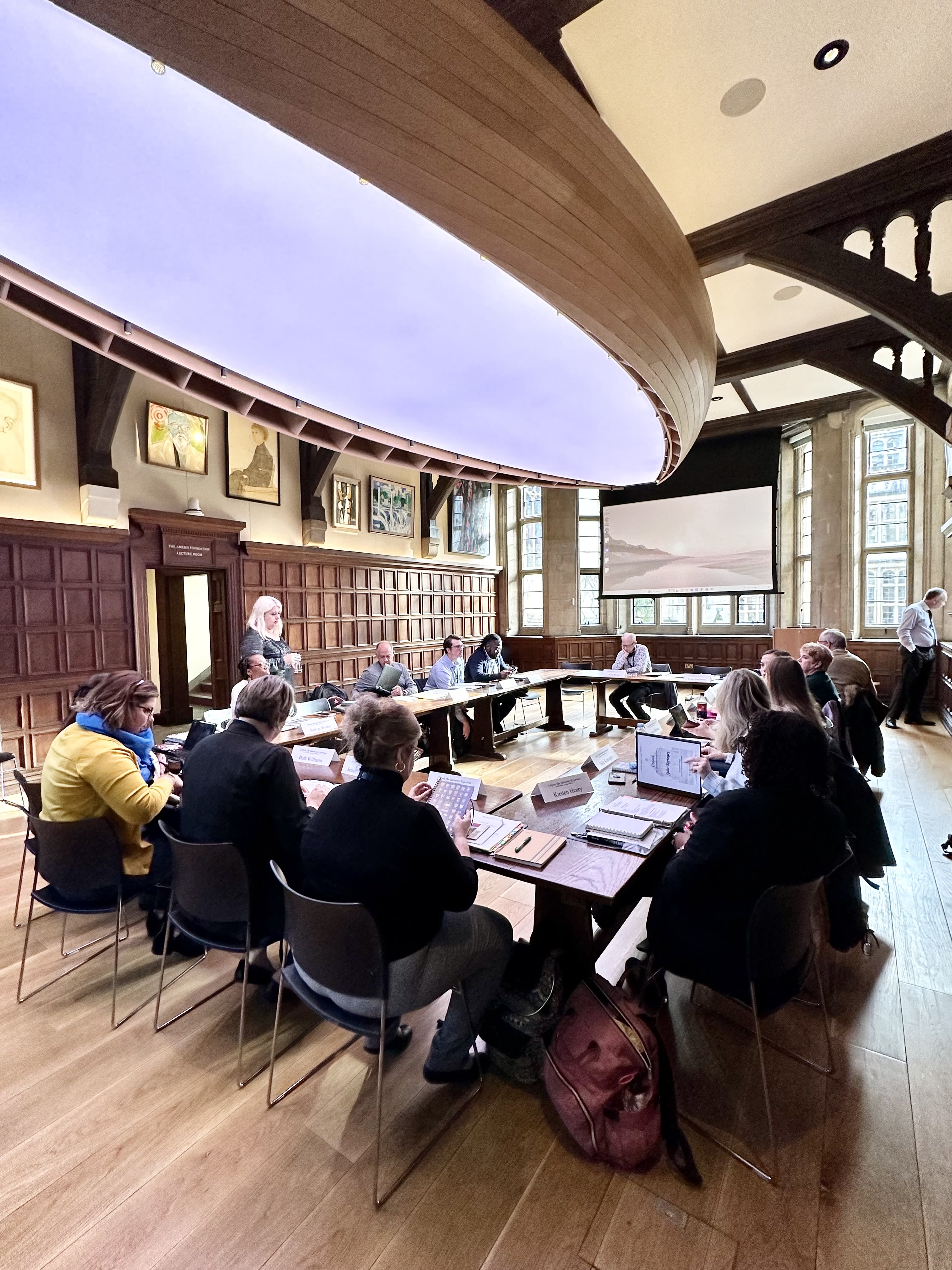
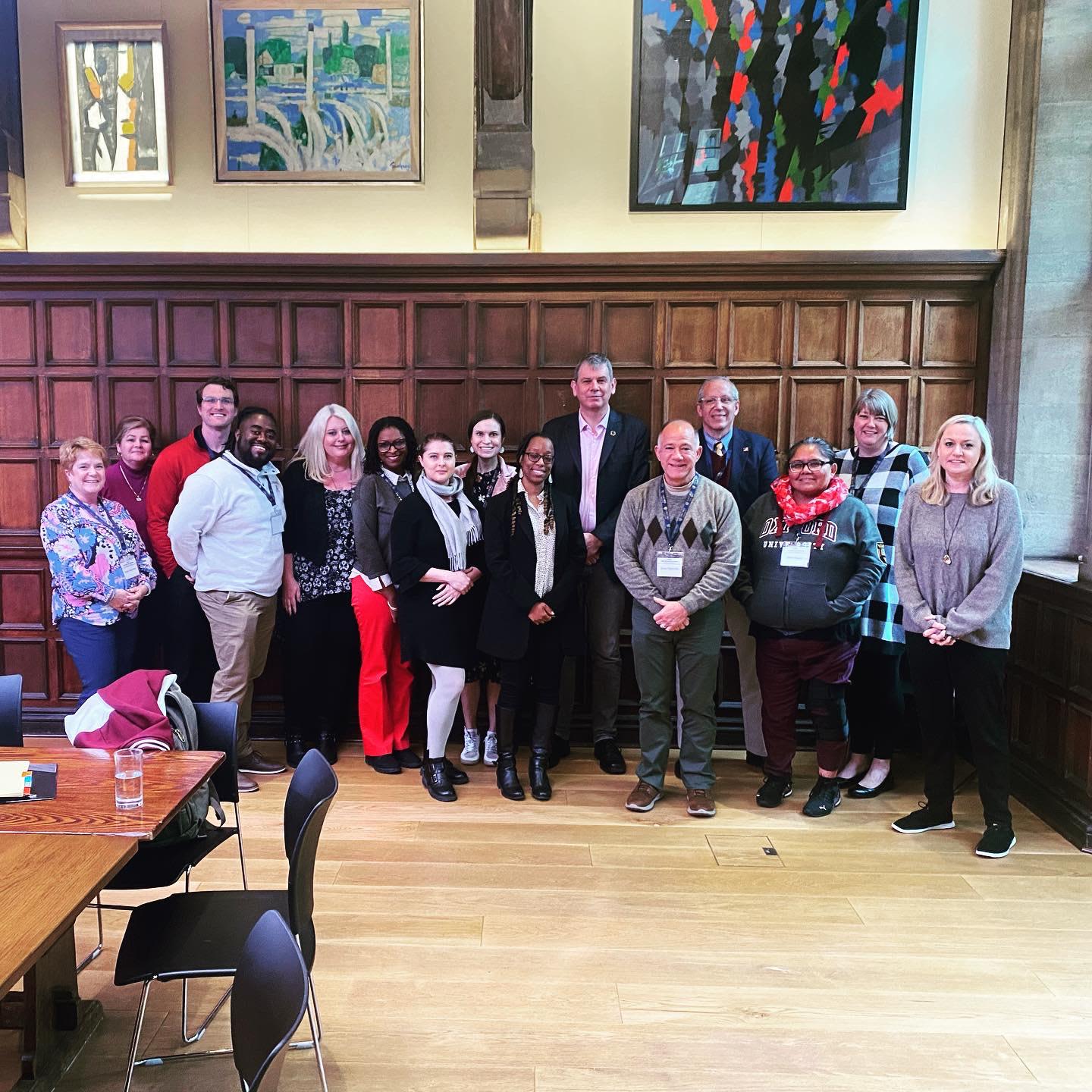

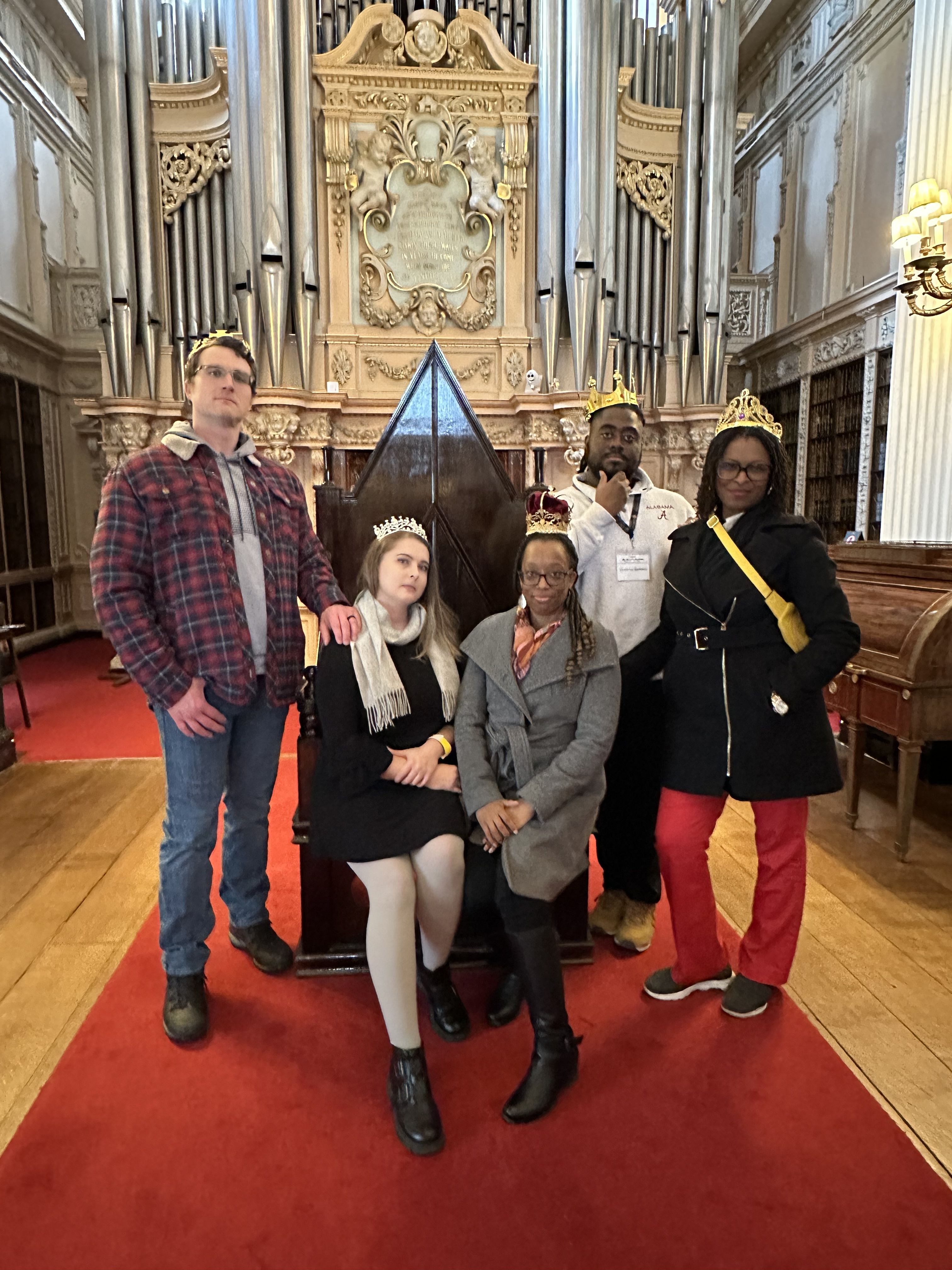
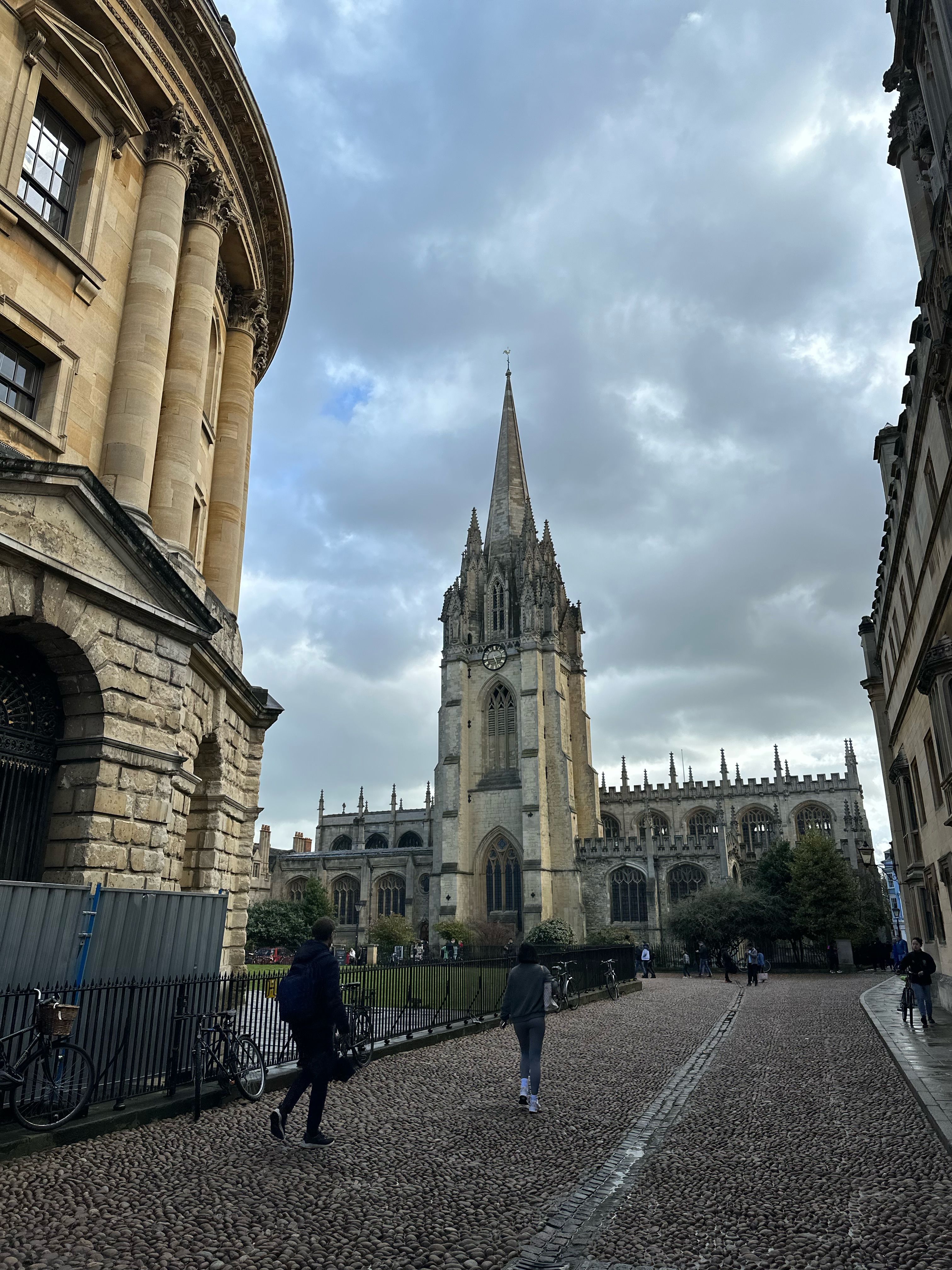












Exploring academics across the pond
Higher education doctoral students travel to England for weeklong study abroad trip
Earlier this year, doctoral students in the College of Education traveled overseas to Oxford, England, as part of the College of Education’s Executive Ed.D. in Higher Education Administration program. During their weeklong visit, they heard from renowned higher education scholars, stayed at one of the 38 colleges on the Oxford University campus, among other activities.
The trip allowed two cohorts of doctoral students to witness the dichotomy and resemblances between the British and American collegiate systems firsthand, said Dr. Stephen Katsinas, professor of higher education and political science and director of the UA Education Policy Center.
“The students got a real opportunity to see the British roots of the American education experience and how our colonial and Ivy League colleges are rooted in those traditions,” he said.
Dr. Katsinas and Dr. Laura McNeill, assistant professor and program coordinator of the Instructional Technology master's degree program, attended the Oxford excursion as well.
“I was thrilled to have the opportunity to accompany the Executive Ed.D. students,” Dr. McNeill said. “They are such a diverse group of individuals, and just having the chance to learn with them over the course of the week, to go sightseeing, talk over breakfast, lunch, and dinner was just wonderful.”
The group was escorted through the university and hosted by Oxford alumnus Dr. F. King Alexander, nationally recognized academic researcher and professor of higher education funding and public policy, and his wife Dr. Shenette Alexander, coordinator of the Oxford International Round Table.
“Elites of many countries have been sending their students, their best and brightest in leadership to Oxford for several years. It's an amazing institute,” Dr. Katsinas said.
Lodging in the historical residence halls of Brasenose College – located at the heart of the university – gave the cohorts an immersive Oxford student experience and helped them feel they were part of the community, said doctoral student Demitrius Barksdale, assistant director of Professional Development and Engagement and adjunct professor for the Culverhouse College of Business.
“There was something so humbling about that, (but) it was also intimidating. It made me aware of how I was taking care of my space,” he said. “I felt very comfortable, but it was very humbling. Every time I went back to my room, it felt like home but always reminded me of why I was there. … ‘I'm here for school – this is the purpose of why I'm here.’ ”
The original Brasenose Hall was constructed in the 13th century, with the college later being established in 1509 on the same grounds. The college is home to one of the world’s oldest rowing clubs, and with rowing being one of Oxford’s primary intercollegiate sports, the university’s biggest rivalry is its competition with the University of Cambridge.
“People in our part of the world think Alabama and Auburn is a big rivalry. They've been in competition with each other for 400 years,” Dr. Katsinas said.
Throughout the week, the doctoral students completed coursework and heard from higher education professionals in addition to Drs. F. King and Shenette Alexander. Some of those guests included Duncan Ross from the Times Higher Education as well as Simon Marginson, Oxford professor, director of the ESRC/RE Centre for Global Higher Education, and editor-in-chief of the journal Higher Education.
“The speakers Dr. Alexander arranged were phenomenal and so fascinating,” Dr. McNeill said. “Everybody really took the time to soak it all in and ask questions.”
When Dr. F. King Alexander spoke to the students, he detailed “the comparative finance of the English credit system versus the American system,” Dr. Katsinas said. They also discussed how, with England adopting debt-based student loan policies like those in the U.S., British college students are now racking up debt unlike those in surrounding countries, such as Scotland.
Dr. Katsinas said the UA students were able to see how the economics of higher education compares across countries, and he enjoyed seeing them make real-time connections between material covered in his history of higher education course and what they talked about at Oxford.
“If you want to learn about your own culture, go spend time in a different one, and you’ll better understand your own,” he said.
Not only was the trip eye-opening in the juxtaposition of the higher education systems but in the sense of social and cultural similarities and differences as well.
“They do a better job of incorporating religion and social health socialization into academic settings,” Barksdale said. “… There are components that are not hidden in the academic setting there, which lends itself to that student development, that mature side of things. They're having conversations in Oxford that in the U.S. I think we're kind of hesitant to talk about.”
Student life at the university appeared to revolve around three key things: academics, religious institutions, and pubs, he said. They seem intertwined and normalized but are still addressed with a certain level of maturity and reverence.
“Relating it to being an American, the way I saw it was faith, family and community, and future,” Barksdale said. “What I mean by future is preparing yourself to be the best citizen you can be for your community through academics.”
At Brasenose, the group started each day with a full English breakfast and throughout the week visited several locations, including the University Church of St. Mary the Virgin, where they had dinner in the Clore Library, originally built in 1320. They also went to the Bodleian Library and the Ashmolean Museum of art and archaeology, Britain’s first public museum.
Another landmark the graduate students visited was Blenheim Palace, the ancestral home and birthplace of Winston Churchill, which is still occupied by members of the Churchill family. There, they had high tea and were able to try on crowns for a photo opportunity.
“We learned high tea is essentially a moment before dinner where every day you take a moment after work to relax,” Barksdale said. The menu included tea with milk, of course, different pastries, little sandwiches as well as a variety of fruit.
Other stops included the Oxford University Museum of Natural History, the Oxford Botanic Garden and Arboretum, as well as tours of Christ Church Meadow and crew boat houses along the Thames River.
Along the way, the students further connected with their cohort members as well as Dr. McNeill and Dr. Katsinas.
“It was nice to have that casual conversation with students to not only talk about their work with UA but their interests, their future plans, and their experiences,” Dr. McNeill said. “It's different to have that much immersive time with a student, to be there together for the whole week learning, having fun, experiencing everything.”
Barksdale recalled sharing an emotional moment with four classmates in St. Mary’s.
“I think all the cultural the exposure, the experiences kind of hit us all at once,” he said. “We talked about life. We talked about our life experiences and about why we were in higher education. That was a big culminating moment, us having that time together to just reflect.”
These types of experiences are informative academically but also in a societal aspect.
“It sharpened my cultural lens,” Barksdale said. “I think a lot of times when it comes to exploring cultures or global awareness, one of the challenges that hinders people from becoming globally competent is the fear of the differences, socializing in those spaces. But I think, for me, what this has done is helped me to realize that we are different, and things are ran differently, but in many cases, they're not.”
As a doctoral student, he said he felt the trip to Oxford came at the perfect time in his degree and that more UA programs should provide similar explorative opportunities. In fact, Barksdale hopes to advocate for students to have access to experiences like this after he earns his doctoral degree.
“I would encourage anybody to go out (and travel), and don't allow your differences or the fear of exploring differences keep you from doing so, because you’ll realize that there's more in common than you think,” he said.
The Executive Ed.D. program is now in its 18th cohort, and Dr. Katsinas expressed his gratitude to Executive Ed.D. Program Coordinator Dr. Arleene Breaux as well as the College of Education for making these study abroad trips with the doctoral students possible.
“I'm very grateful to Dr. Breaux and my faculty colleagues in the higher education program for their support," he said. "I think it's a real contribution UA makes to Southeast higher education institutions all over. It's an important program, and I’m delighted to be part of it.”

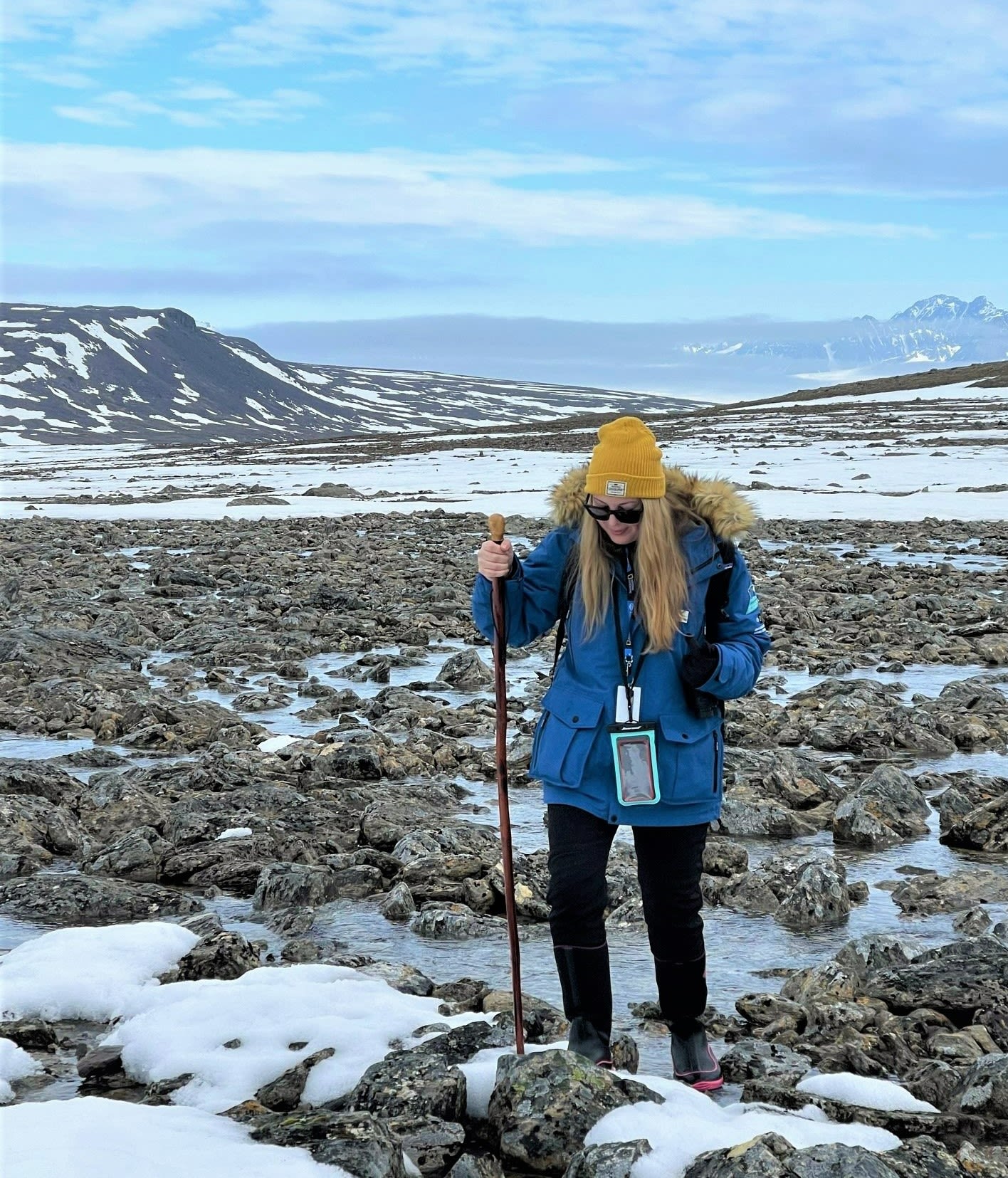
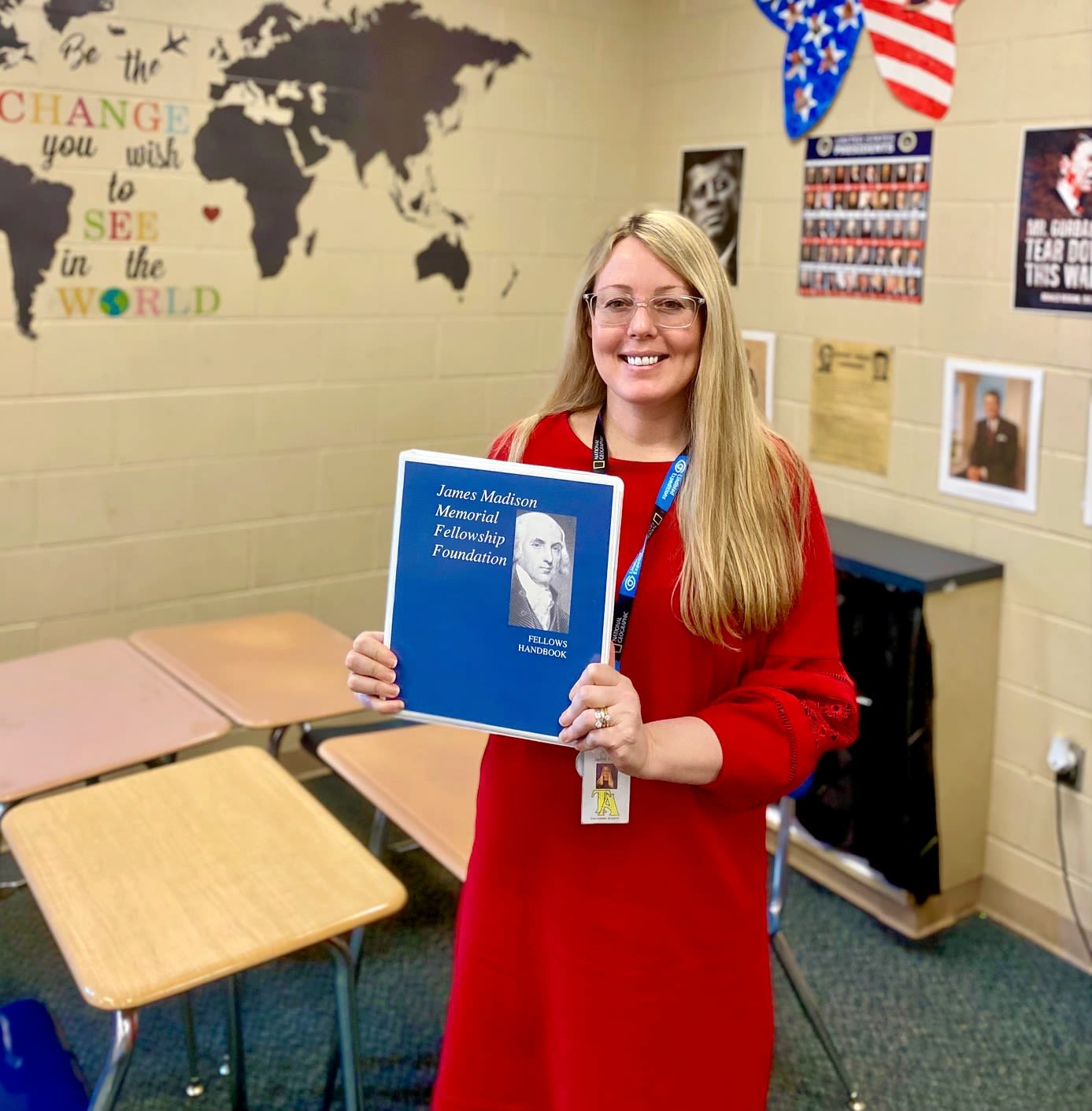
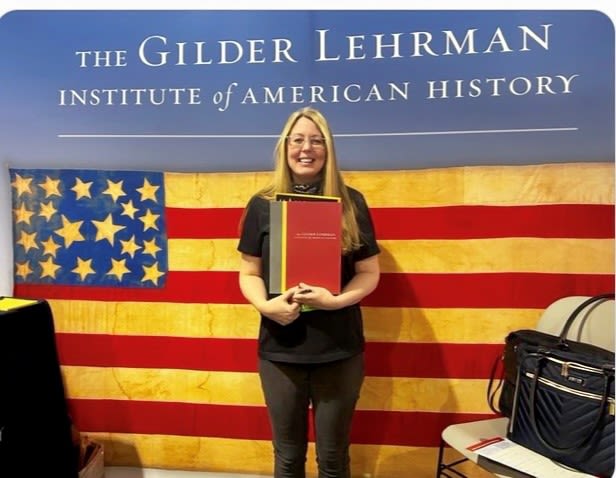

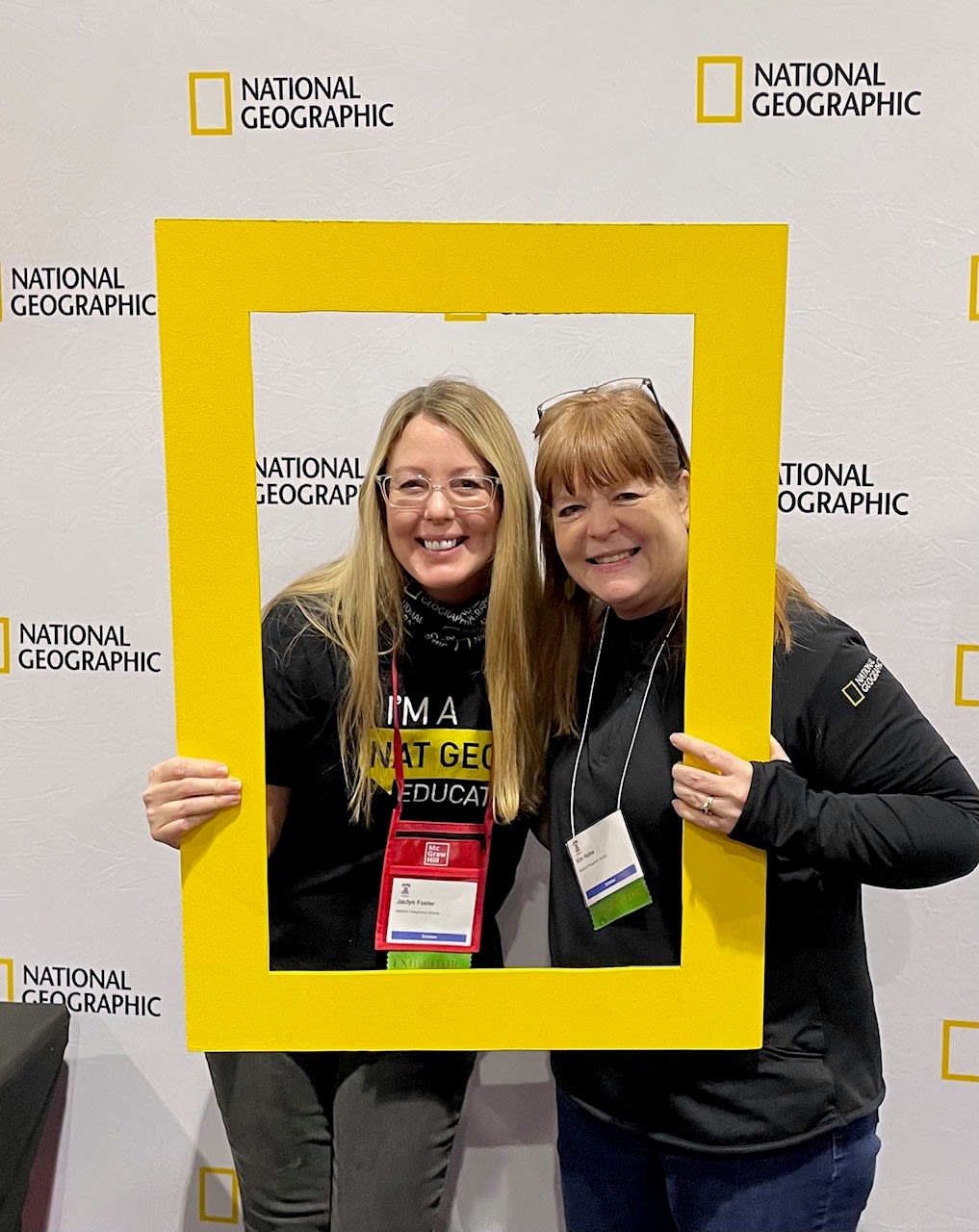
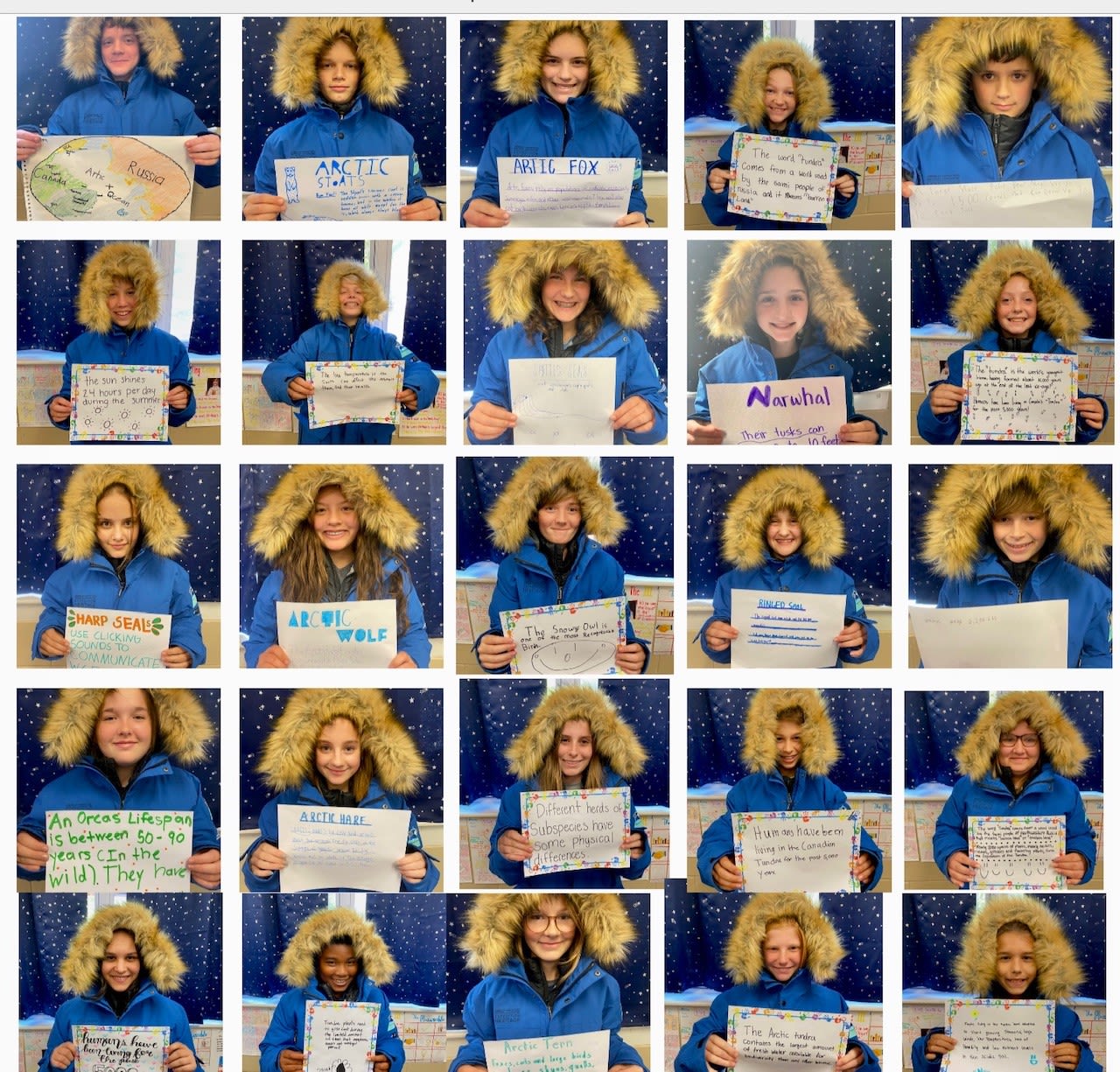

Jaclyn Foster stands on the deck of the National Geographic expedition ship with the Arctic Ocean visible behind her.
Jaclyn Foster stands on the deck of the National Geographic expedition ship with the Arctic Ocean visible behind her.

Foster hikes through the tundra of the High Arctic of Svalbard.
Foster hikes through the tundra of the High Arctic of Svalbard.

Foster poses for a photo after finding out she was selected for the James Madison Memorial Fellowship.
Foster poses for a photo after finding out she was selected for the James Madison Memorial Fellowship.

Foster was honored as Alabama's History Teacher of the Year in 2021 by the Gilder Lehrman Institute of American History.
Foster was honored as Alabama's History Teacher of the Year in 2021 by the Gilder Lehrman Institute of American History.

Students in Foster's class spoke with Jane Goodall and others through National Geographic's interactive Explorer Classroom event.
Students in Foster's class spoke with Jane Goodall and others through National Geographic's interactive Explorer Classroom event.

Foster poses for a photo with Kim Hulse, vice president of education programs at National Geographic Society, at the 2022 National Council of Social Studies.
Foster poses for a photo with Kim Hulse, vice president of education programs at National Geographic Society, at the 2022 National Council of Social Studies.

Foster's students wear her expedition jacket as part of a class project.
Foster's students wear her expedition jacket as part of a class project.
Tuscaloosa Academy teacher selected for prestigious James Madison Fellowship
Jaclyn Foster will complete graduate coursework focusing on the U.S. Constitution next summer in D.C.
After 20 years in the classroom, Jaclyn Foster’s enthusiasm for teaching shines just as brightly as ever. Foster teaches seventh-grade civics and U.S. history as well as eighth-grade human geography at Tuscaloosa Academy where she does her best to make lessons exciting for students.
“I really listen to the kids and what their strengths are, and I try to make it fun. That's the biggest thing,” she said. “If you love the subject and the students see how much passion you have for your subject, then that is going to translate to your students. If you're excited, they're excited, and it's contagious.”
Foster will embrace her own love of learning as she takes part in the prestigious James Madison Fellowship Program, first attending classes at The University of Alabama this summer then traveling to Georgetown University next summer to attend in-depth courses concentrating on the U.S. Constitution, its history, and principles.
Funded by the U.S. Congress, the James Madison Fellowship is dedicated to helping secondary history, civics, and government teachers reach an extensive understanding of the Constitution and become outstanding educators in constitutional studies, according to the James Madison Memorial Fellowship Foundation website. The $24,000 award is highly competitive, and only one educator from each state is selected annually to participate.
During the fellowship’s four-week summer institute next year, the educators will complete the “Foundations of American Constitutionalism” graduate course while also having the chance to visit historic sites around the capital linked to the U.S. Constitution. They will study and learn from top constitutional scholars, connect with their peers, and could even meet with Supreme Court justices during their stay in Washington, D.C. Not only will they expand their knowledge of American history, but they will also enhance their professional and pedagogical skills in relation to covering the topic in their classrooms.
“Usually (when teaching the Constitution), I just touch the surface because it’s a one-semester class, so we’re not getting that deep into it,” Foster said. “I'm really hoping this is going to give me some creative ways to bring such a difficult topic to the level of a 12-year-old.”
Foster’s passion and abilities as a teacher have been recognized multiple times in recent years, including her being chosen as the 2018 Educator of the Year by Greene County Public Schools. In 2021, she was named Alabama History Teacher of the Year by the Gilder Lehrman Institute of American History, which Foster said was “one of the biggest shocks she’s had,” partly because she knew someone chose to nominate her for the honor.
“Teachers often don't get much recognition, and I've been fortunate later in my career,” she said. “It's been wonderful. … Being able to seek out opportunities that can make me a better teacher has really helped my teaching.”
Foster was also selected in 2021 for the Grosvenor Teacher Fellowship with the National Geographic Society and Lindblad Expeditions and given a once-in-a-lifetime opportunity to travel to the High Arctic of Svalbard, located off the coast of Norway.
Each expedition gives fellows the educational journey of a lifetime that they then translate into new geography-related learning experiences for their own students. The fellows also take on ambassador and mentor roles for two years as they assist with National Geographic’s educational initiatives.
Foster, a fan of National Geographic since she was young, was thrilled to venture to the High Arctic. With a team of three other Grosvenor Teacher Fellows, as well as professionals, experts, and specialists, she climbed aboard the National Geographic expedition ship, which took them through the icy waters of the Arctic Ocean.
“If you love the subject and the students see how much passion you have for your subject, then that is going to translate to your students.”
“I spent last summer with polar bears and kayaking around icebergs,” she said. “It was the most incredible experience ever.”
Throughout the trip, the team hiked, kayaked, visited and learned about different locations, and soaked in the scenery and wildlife around them. Though temperatures were abnormally warm and melting 50 miles of ice per week that season, Foster said, the group spotted a polar bear on the very first day – a special moment for everyone on the ship.
“When else are you going to see a polar bear in its natural habitat? It was unreal,” she said. “Seeing one up close and then being able to bring that (experience) to my classroom and show my kids the photos, it has a much stronger impact. They were very excited.”
Foster was eager to share her High Arctic experience with her students, and she and the other educators discussed how they could weave all they learned and witnessed into different lessons and projects back home.
“It absolutely changed me,” she said. “I've been able to incorporate that into my human geography classes, about how things that humans do impact our environment, impact the animals that live there, and the habitats … it has had a very big impact on my teaching.”
Through the International Arctic Buoy Programme’s outreach project called Float Your Boat (FYB), Foster’s students have been able to learn more about the changing polar climate. FYB sends classrooms small wooden boats for students to decorate and send back, then it ships them off to be deployed into the Arctic Ocean with GPS buoys attached. The project is dedicated to educating young people about the Arctic Ocean and the transformation of its sea ice by allowing them to track the boats as they move through the North Pole. Eventually, one of the boats could wind up on some distant shore, and since “www.floatboat.org” is etched into the boats, anyone who finds one can report its location through the FYB website.
Foster’s class also had the chance to attend a National Geographic Explorer Classroom session via Zoom with renowned primatologist and anthropologist Jane Goodall. The students were able to ask questions and learn about a program called Roots & Shoots that Goodall started in 1991. It encourages young people to get involved with projects and initiatives that matter to them and will help better their community and the environment.
“After my expedition to the Arctic, I had students come up with ideas we could do locally to help our environment and wildlife,” she said. “We came up with the idea of creating a hummingbird garden and applied for a grant from the Jane Goodall Institute.”
They received the grant and with that funding were not only able to bring the hummingbird garden to life but to begin their own school-wide Roots & Shoots program as well — both of which were successes, Foster said.
“We were just honored with another grant to continue the funding through next year,” she added.
The James Madison Fellowship trip to D.C. next summer is another opportunity for Foster to implement a special experience into lessons and to use the constitutional knowledge from the coursework to enhance her students’ learning.
“I'm a lifelong learner, so I like that I'm going to learn about something I'm not exactly an expert in,” she said. “This is something that's going to translate back into my classroom, which is exciting.”
Upcoming Events

SEPT. 2
Alabama vs. Middle Tennessee
The Crimson Tide football team will face off against the Blue Raiders at Bryant-Denny Stadium for its first game of the 2023 season. Kickoff starts at 6:30 p.m.

OCT. 14
Homecoming 2023
Registration and dates for events and participation will be available early in the Fall 2023 semester.
Student Deadlines
JULY 11
Last day to drop courses for Summer Full Term
Drops after this date must be approved and processed by the student's college.
AUG. 2
Summer classes end
This is the last day students can withdraw from the term without requiring approval from their college Dean's office.
AUG. 3-4
Final exams
For more information, please visit catalog.ua.edu/undergraduate/about/academic-regulations/curriculum/final-examinations.
AUG. 5
Summer commencement
The ceremony will begin at 9 a.m. Visit commencement.ua.edu to view the live webcast or for additional information.
AUG. 23
Fall classes begin
Classes begin for Fall 2023 Full Term.
SEPT. 8
Fall enrollment bill due
Payment in full or participation in a payment plan is required before noon for all Fall 2023 bills. Schedules will be canceled for students who haven't paid in full or participated in a payment plan before noon on this date.
If you are using a payment plan, please check studentaccounts.ua.edu/calendar-2/ for those due dates.
OCT. 6
Degree application deadline
Last day for graduate and undergraduate students to submit a degree application through myBama. Only after petition and approval by the student's college will an application be accepted after the published deadline. If approved, the student will be assessed a $25 non-refundable late fee in addition to the degree application fee.
OCT. 30
Spring 2024 registration begins
Time assignments for registering will be available Oct. 1.

DEC. 16
Fall commencement
Visit commencement.ua.edu for additional information.
For other editions of the College of Education Newsletter, visit our archive.
If you have an event, know of someone who should be highlighted, or have any other story ideas, please let us know.
Contact Kelcey Sexton at klsexton@ua.edu and 205-348-5528 or Dr. Rebecca Ballard at rebecca.ballard@ua.edu and 205-348-7936.
